#me: give an example of a great person in history who was not a military conqueror
Explore tagged Tumblr posts
Text

#me: give an example of a great person in history who was not a military conqueror#Hegel: no.#no offence but Alexander Fleming did more to make the world a better place than Caesar ever did#not a 100% fair interpretation of Hegel because he probably did more to disavow great man theory of history than anyone before him#but he *did* go on to replace it with strange praises for nationalism so he’s not off the hook imo
4 notes
·
View notes
Text
Dictatorship (Rhysand's version)
I made a post of Rhysand and Feyre being Donald and Melania Trump in another universe and have called him and the inner circle the definition of Fascism, nobody better not get butthurt over this. If you do, I don't give a fuck.
IF YOU LIKE RHYSAND AND/OR THE INNER CIRCLE, THIS POST IS NOT FOR YOU! LEAVE NOW, I WILL BE SHITTING ON THEM!
Let's start with a definition. What is dictatorship? A dictatorship is a government or a social situation where one person makes all the rules and decisions without input from anyone else. What is a dictator? A dictator is a political person who rules a country with total authority and often in a cruel or brutal way.
Notorious dictators and dictatorships in history are: Vladimir Lenin and Joseph Stalin of the Soviet Union, Benito Mussolini of Fascist Italy, Adolf Hitler of Nazi Germany, Hirohito of Imperial Japan, Pol Pot of the Khmer Rouge, and Mao Zedong of People's Republic of China.
Rhysand is the High Lord of the Night Court and has earned himself a reputation of being a cruel and evil man to the other Courts of Prythian. To others, the Night Court is seen as the Court of Nightmares; a land of cruelty but it's only a cover up to hide Velaris, the city of starlight and where Rhysand truly lives. The existence of Velaris is unknown with the expectation of a few people.
What makes someone a dictator? Google did not give me a clear answer so I had to go on Chat GPT and it gave me this (apologies if you don't like ai): Concentration of power, control over military and security forces, propaganda and censorship, repression and human rights abuse, and economic control. There are three more examples but I picked the ones that relate to Rhysand the most.
Concentration of power: As High Lord, Rhysand is the most powerful person in the Night Court. What he says, goes. His word is law. You can't go against him without facing punishment for it. If you are from Velaris, it doesn't matter because to you, Rhysand is a nice guy and a good ruler. To those in Illyria and Hewn City, he pays no attention to you. He doesn't give a damn about you.
Control over military and security forces: Whenever battle or war is coming, Rhysand goes to the Illyrian warriors and their warbands to aid him. He also has the darkbringers, elite warriors from the Court of Nightmares and are under the leadership of Keir come to his aid when Hybern attacks. Velaris was attacked in ACOMAF and Rhys and the inner circle went to defend their home and people but have they done the same for the Illyrians? Hewn City citizens? To them, the safety of Velaris will always be more important than the other two regions. That's just sad.
Propaganda and censorship: When it comes to making decisions, Rhysand either makes them himself or with the help of the inner circle. They may agree but as the high lord, his authority can never be challenged by them. As it is known to many, Rhysand has a track of using manipulation for his own gain or his court. Because of this, it forged the "the night court is evil" belief and the daemati powers don't make things better. He manipulates Feyre in the first book and makes her his pawn, doing it without her consent. Rhysand keeps many secrets hidden from the other courts which is somewhat normal but there are secrets that are crucial for other courts to know of. The cauldron for example or the book stolen from the summer court. He'll justify it as a way of protection when it's really not. (The pregnancy thing in acosf, cough.) He uses fear and intimidation when he feels it necessary and/or to keep control and it works all the time. An example would be how he acts when he visits Hewn City or the Spring Court.
To the night court, Rhysand is this great hero who sacrificed so much and will do anything for them. Which is true but it only goes for Velaris. To the other courts and Hewn City, Rhysand is as I said before, cruel and evil. The way the inner circle speaks of Rhysand (straight up dick riding), you would think he's one of the best things since sliced bread.
Repression and human rights abuse: What is repression? It's the act of using force to control a group of people and limit their freedom. What group in acotar has limited freedom and/or are controled? You guessed it, Hewn City citizens and Illyrians! What is human rights abuse? Anything that harms a person's rights but in this case, let's go with abuse of rights (since Illyrians aren't human).
The women of Illyria and Hewn city suffer under the system of men. In both regions, it rules under a patriarchal system. The Illyrian women have their wings clipped so that they can be used for breeding purposes and the Hewn women are sold off into marriages, even bidding their virginities. All these women face abuse (either physical, mental, or sexual) and their high lord has done nothing to stop it.
Rhysand knows the pain of sexual abuse and yet, this still happens to the women. "But the library!" HOW THE FUCK ARE HEWN WOMEN GOING TO MAKE IT THERE? HE DOESN'T LET THEM LEAVE, THINKS THEY'RE ALL EVIL, AND THEY DON'T KNOW IT EXISTS?
A woman with Illyrian wings is never mentioned; yes, we don't know if there is one or not but you think that a lady with big bat wings, someone would point it out. You're telling me that I'm getting abused by all the men in my life and there's a haven for women like me but I can't get access to it because I was born in the court of nightmares?
Ah! ça ira, ça ira, ça ira, Les aristocrates à la lanterne! Ah! ça ira, ça ira, ça ira, Les aristocrates on les pendra!
You may say that Rhysand has to let the Illyrians do their own thing so that they cooperate with him but here's the thing, Rhysand is a daemati. Daemati is the ability to control and infiltrate a person's mind. He could easily go into the minds of the Illyrian men and tell them to stop with the wing clipping and boom, problem solved but he doesn't. The same thing with Hewn men, go into their mind and tell them to stop these arranged marriages and biddings.
But as long as Rhysand needs soldiers and as long as Velaris is at peace, Illyria and Hewn city will suffer for it. The sins of the father if you want to call it. Always an angel (Illyria and Hewn city), never a god (Velaris).
Economic control: What is economic control? It can be seen as a form of abuse as it prevents someone from gaining financial independence. Measures of which governments use to manage and/or their economy.
The Illyrians have it rough. Like rough, rough. They don't live in houses like Velaris or Hewn City citizens. They live in war camps. WAR CAMPS. Their situation is so bad that Cassian handed out blankets. I'm taking a guess and going with the idea that the Illyrians use their money on weapons and training, etc. "Who needs proper housing when we can fight!" I know they make their own money through trade or selling/making clothes but y'all can't afford to make a house?
A lot of the riches in the night court is stored in Velaris but where the hell do they get it from? Their mountains? It will eventually run dry. Trading? Why must the Illyrians live like this and not experience a similar life to Velaris? They don't have to change the entire thing but at least, build them houses or cottages.
Do you know what a war camp looks like in real life?
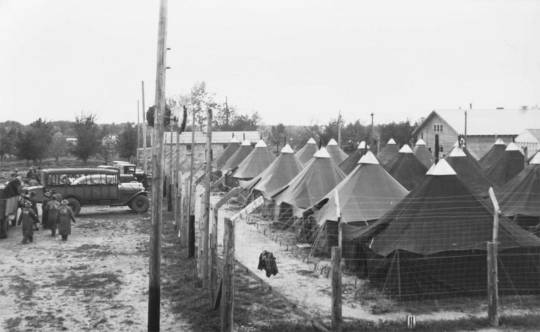
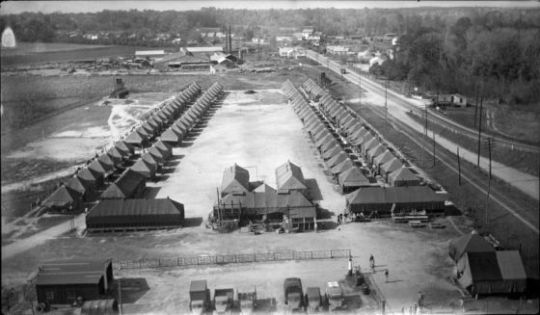
But this is a fantasy book so it looks like this:
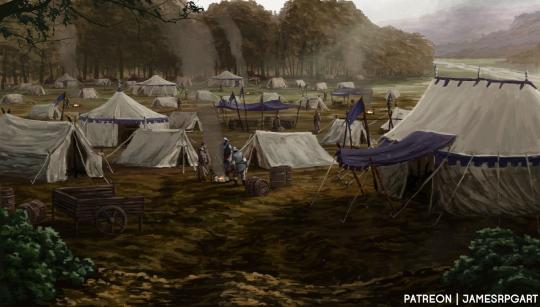
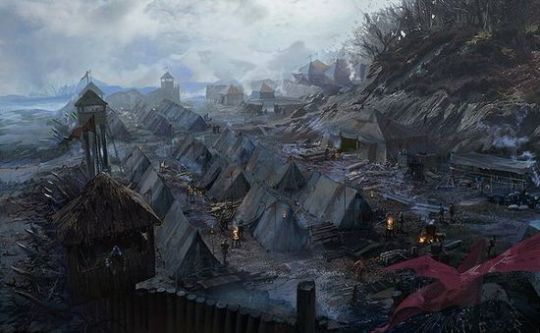
This is not a post to be taken seriously, it's just for fun, I enjoy writing analysis (analyses?) on things I like or hate, no in between.
I am only a woke libtard who doesn't turn off their brain to enjoy a book but instead, will read and analyze/give my critics😔. If only I could act like you booktok girlies who don't bat (get it?) an eye at the weird choices and decisions in the series and who will eat up the very questionable actions of my favorite morally grey man because tattoos, dark hair, shadow daddy, grooming underage girls, committing acts of sexual assault, being abusive and justifying that abuse because tragic backstory, yada yada.
I hold some of my favorite characters accountable for their actions but I don't justify it, it's very easy to do. Yes, they have trauma but it's not an excuse to do what they did.
I am only a teenage girl who loves to hate and act like a hypocritical bitch because what's more fun in life than making grown adults mad because of my unpopular/controversial opinions?
Why are you mad that I'm insulting your "book husband"? It's not my fault your book husband is a POS and that your own husband that you married can't satisfy you so you have to turn to fairy porn and hardcore smut to get rid of your blue balls.
I would like to give thanks to @sonics-atelier for giving me some help and thanks to booktok for unironically making me hate men.
Edit: "You're taking this too seriously!" Number one, I don't care. Number two, I'm a history nerd who once spiraled down a path of learning about dictators. Number three, I'm an American. I know what a dictator looks and acts like, we're going to have one in office for the next four years.
(This has been sitting in my drafts for months and whenever I felt like it, I worked on it.)
#rhysand critical#acotar critical#anti rhysand#sjm critical#acotar analysis#acotar rant#anti inner circle#anti ic#inner circle critical#ic critical#illyria acotar#hewn city#court of nightmares#anti velaris#anti booktok#booktok critical#i love being a hater#anti night court
44 notes
·
View notes
Note
Can you recommend three history books that you couldn't put down and would be good xmas gifts for a history nut? Doesn't need to be presidents just any history.
I could spend the entire holiday season debating which books to suggest, so I'm just going with the first three books that came to my mind when I considered which books I'd choose if I could magically read them for the very first time again. Anyone would has been following me for a while will have heard me recommend these before because they are among the very best books I've ever read:
•Crucible: The Long End of the Great War and the Birth of a New World, 1917-1924 by Charles Emmerson (BOOK | KINDLE | AUDIO) It's difficult to describe this book in a way that illustrates how incredibly interesting and original it is. It's a look at the world as it came out of World War I and slowly tried to repair itself in the Great War's aftermath. But during that period, various personalities start appearing in the story like characters in a gripping novel. Those people end up being many of the leading figures of World War II and that becomes apparent as you read the book, as does the fact that the tense state that the world was in at the time wasn't a time of peace and reconstruction, but an incubation period for what would become an even more horrific world war that was the deadliest military conflict in the history of our species. Those leading characters in Crucible drive the story, not so much because of how extraordinary they became but because of how ordinary they were when they started. Emmerson tells these stories in an extremely creative way, and it makes the 739-page book fly by despite the fact that you will NOT want it to end. Without hesitation, I can confidently say that Crucible (which was published in 2019) is the single best book I've read in the past ten years.
•Rise and Kill First: The Secret History of Israel's Targeted Assassinations by Ronen Bergman (BOOK | KINDLE | AUDIO) This doesn't mean that I'm giving my stamp of approval to Israel's long history of targeted assassinations and daring special operations. But this book is an excellent example of top-notch investigative reporting and war journalism by Ronen Bergman, who is still an immensely talented correspondent for the New York Times with deep connections throughout the Middle East. Some of the military and intelligence operations described in this book with shocking detail are absolutely mind-blowing and would seem too far-fetched if you saw them in a movie. Bergman's book gives the reader the perspective of being embedded with forces as they undertake these ridiculously dangerous missions.
•Raven Rock: The Story of the U.S. Government's Secret Plan to Save Itself -- While the Rest of Us Die by Garrett M. Graff (BOOK | KINDLE | AUDIO) Speaking of journalists with remarkable connections, in Raven Rock Garrett Graff reveals aspects of the blueprints for America's continuity of government planning that have never been fully detailed. Beginning in the early days of the Cold War, Graff takes us through the creation of top-secret plans to keep the government functioning in case of all sorts of Doomsday scenarios. It's incredible to learn what would be prioritized (and how anything would still function) and where surviving members of the government (or their designated alternates -- which is an even crazier revelation) would run what was left of the United States in case of massive attacks that might decapitate vast sections of federal, state, or local governments. What should seem somewhat reassuring -- the fact that the government would continue to function and serve survivors, no matter what -- is frightening when Graff reveals systems that raise far more questions than it delivers answers. It even raises questions about aspects of the shadow federal government that existed during the Cold War (just in case). In some ways and for many reasons, the book is actually pretty frightening. (You'll probably start worrying about the records the U.S. Postal Service keeps about you considering all of the potential uses the government considered using it for in case of a widespread nuclear attack with massive numbers of casualties.) But it's also incredibly interesting and full of amazing details about secrets that I guarantee you'll want to share with people after you read the book. Raven Rock is right behind Crucible when it comes to the very best books of the past decade.
#Books#Book Suggestions#Book Recommendations#Recommended Reading#Reading Material#Recommended Books#History#Political History#Military History#Crucible#Crucible: The Long End of the Great War and the Birth of a New World#Charles Emmerson#Rise and Kill First#Rise and Kill First: The Secret History of Israel's Targeted Assassinations#Ronen Bergman#Raven Rock#Raven Rock: The Story of the U.S. Government's Secret Plan to Save Itself -- While the Rest of Us Die#Garrett M. Graff#Garrett Graff#To Read
33 notes
·
View notes
Note
wait im kinda new the 3k fandom, is half of it actual history and the other half just… homoerotic relationships with right-hand-mans?
first of all, welcome aboard! tldr: if your historical RPF doesn't ruin a politician's reputation for the next 800 years, are you even doing it right? yes Romance of the Three Kingdoms is based on actual history! it's set in the early 3rd century Han Dyansty (around 200 CE), during a bloody on-and-off civil war called the Three Kingdoms Period. The novel itself was written in the 14th century, nearly 1100 years after it all went down. if you disregard (most) of the supernatural elements, the story is fairly accurate, around 3 parts fiction and 7 parts fact. The novel was based on a compilation of historical records called the Records of the Three Kingdoms.
I must apologise on behalf of me and the mutuals for giving you a skewed impression of the homo. Sadly 3k is about 70% history, 25% socio-political allegory and only 5% Manly Love Between the Liege and His Vassal. Homoeroticism-Cao who was defeated at Red Cliffs and pines after the enemy general every sichen was an outlier and should not have been counted. that's on us.
the 3k novel was written during a time of civil unrest and a crises of national identity. during the Yuan dynasty parts of China were taken over by the Mongols, which eventually collapsed and gave way to the Ming. the author Luo Guanzhong lived during the late Yuan-early Ming period, he saw himself as an intelligent and capable man who never managed to find a worthy liege or a great cause to serve, in the end he became disillusioned and sunk to the lowest possible depths for a gentleman-scholar; writing novels (gasp!). the novel is only attributed to him because it was published anonymously, but it fits his MO. for example, Liu Bei's civil advisor/PM Zhuge Liang was changed so much he basically became the author's self-insert; he is a scholar-recluse who finds a worthy, benevolent master and then devotes his entire life to fulfilling his dreams of unifying the country. and also he's a military genius who single-handedly defeated cao cao and then everyone clapped.
This was also where a lot of revisionism became codified. Prior to this, Cao Cao was considered the real hero of the story, especially by the educated elite. His empire was also succeeded by the Jin Dynasty, so of course they needed to legitimise him. Liu Bei was seen as an opportunist and a disruptor, though he was always beloved by the common people who related to his struggles and were touched by his (seemingly genuine) kindness to them. The big change happened because after the Mongol invasion, the Yuan was split in two, the official dynasty submitted to Mongol rule. The other part saw themselves as the underdogs and righteous rebels, just like Liu Bei standing up to Big Bad Cao Cao.
Prior to this, 3k mainly existed in the form of folktales with different interpretations, and LGZ was the first person to create a single, unified narrative out of it. there's really cute accounts of contemporaries in different dynasties being all "idgi? all the kids boo when cao cao shows up, but they cheer when liu bei wins, and cries when he loses." truely a Blorbo of the people.
24 notes
·
View notes
Note
https://vm.tiktok.com/ZGJEygy6e/
Okay but it's an issue we should discuss when they post videos like this. Had for example a Turkish person get any other Balkan country they would laugh about it, but when they get Greek they throw a tantrum.
Also many deny that they may have Greek DNA after hundreds of years of marrying Greek slaves so why do they act surprised 😅
You linked this video:
Like... let me be totally honest... I am weirded out by young Greek (and sometimes Turkish) people who act like it's such a shock when it comes to their notice (finally) that some Greek and Turkish people do not like each other. A lot of young people claim that the hostility between the countries is purely politically motivated and does not represent the people at all but that's not entirely true. Because no matter all the political propaganda against each other, for it to work and spread, the everyday people have to actually be receptive of it, whether in full earnest or even by decriminalizing it as a joke. The reason Turkey politically holds an aggressive stance against Greece for decades or maybe since its foundation, the reason this political strategy works, is because a lot of people are receptive and approve of it or just don't mind it enough to not make jokes with it. Of course many many Turkish people say they love our cultural similarities and love their Greek friends and come here for holiday etc etc , but this doesn't change the fact that if you ask them, most of them will agree that Turkey must expand and Greece should shrink or that Greeks unfairly revolted against the perfect good Ottoman Empire or they will attempt to diminish the cultural and historical impact and imprint of the Greeks in Asia Minor. Similarly, Greek people might acknowledge that Erdogan does not represent all Turkish people and that we have many similarities between us and that Turkish culture is beautiful but that doesn't change the fact that all Greeks will pick Turkey as the number one military threat for Greece or that they don't all express bitterness and contempt for the Greek cultural progress stump during the Ottoman occupation or that they are not angry at the Ancient and Byzantine Greek cultural erasure that is taking place in Turkey now. Greeks and Turks can be great friends but it has to work through mutual agreement to never take a serious side in any of these issues in earnest because sooner or later there might be arguments. Again, this is not for every Greek or Turk, but it is really a big percentage unfortunately.
This Turkish girl who was turned off when she got the Greek flag, she commented that it was kind of a conscious joke and I don't think it was so serious. The Greek girl makes a fair point but there is indeed a point she is missing - Turkish school actively portrays Greeks as oppressors!!!!! Greeks are portrayed as a) ancient oppressors (Turks also follow the late Balkan trend of trying to claim heritage from extinct ancient cultures like the Hittites and the Luwians and a lot others who they absolutely have no connection to and try to portray themselves as the original victims and the Greeks as the aggressors (despite the teeny tiny detail that the ancient non-Greek Anatolian peoples fought and killed each other way more than they ever fought with Greeks), b) as medievally extinct (it is a BIG NO NO to admit that the Byzantines were mostly Greeks especially in the late period they got in touch with them or to refer to the largely Greek cultural identity of the Eastern Romans / Byzantines or sometimes to even consider that the Byzantine Empire had a great culture and history as they often claim Ottomans saved the Byzantines from themselves (???) by conquering them!!!!!!, c) the Modern Greeks as horrible and ungrateful traitors, as the Ottoman Empire was a utopia giving them countless rights and benefits and those rats dared to rebel against it, d) the current Greeks as unreliable potential aggressors, with the argument that Greece invaded "Turkey" in the early 20th century, which technically wasn't Turkey yet but the dissolving Ottoman Empire and with the excuse of World War I either the great powers or the neighbouring countries with nationals in these lands were making claims (while of course simultaneously they deny the Greek and Armenian and Assyrian Genocides, they deny the countless progroms against them and they deny that at the time Greece was making such claims the coasts of Asia Minor indeed still had Greek majorities in most areas and Turks were deeper inland but of course then they killed or kicked everyone out and Greek majority was no more, problem solved!). So they entirely paint Greeks as the bad guys and refuse all their widely ascknowledged war crimes. With this in mind, of course the youngsters make jokes such as "oh what my ancestors would think of me dating a Greek dude". Your ancestors were getting more Greek dudes than you, dear. And I am not saying it as an insult. It was mutual. Our Greek ancestors also were getting more Turkish dudes than us. But it was the Turks' choice to take these lands by force. Pretty sure they were not invited by the indigenous people.
However, this was NOTHING. Let me present you the real deal. You think that was problematic? Please! Watch this one. And honestly it is hilarious. I have watched it 100 times and I laugh every time. I just don't care. I don't know if this man is a troll acting as a nationalist or just unstable but he has a tiktok full of those and he's always screaming so I suppose it's parts comedy. I don't care either way, it's funny! No point in taking this seriously.
youtube
33 notes
·
View notes
Text
Suchwita, Ep. 12
SPOILER ALERT! If you don't want to know what we learn in this episode yet because you want to watch it yourself, scroll past, don't read.
June 10, Episode 12 of Suchwita ... as it turns out, we learn that Jin was the second-ever guest of Suchwita after Namjoon, and this was filmed Friday, Dec. 9, four days before Jin enlisted.
And here we go, not 45 seconds into it and I'm teary-eyed. WTF? I miss Jin.

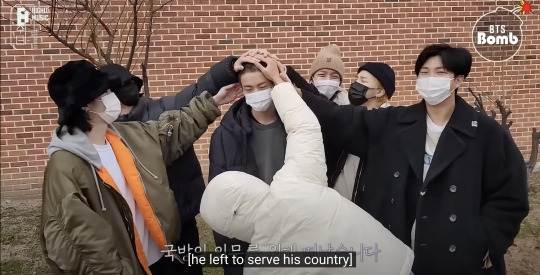
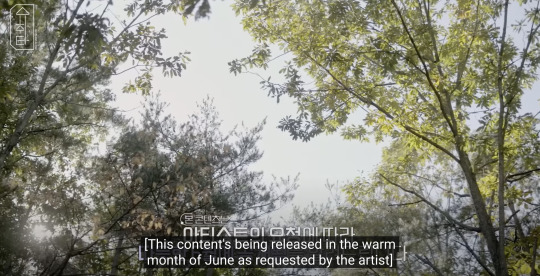
Is it just me? Am I that big of a crybaby? I don't know why Jin makes me so emotional. I am so happy though that my BTS journey has allowed me to get to know him better and deepen my feelings for him because it sure wasn't that way in the beginning.
And I KNEW IT! Jin is making his own alcohol with Chef Baek's assistance and will have some ready when he's discharged from the military. I wondered about that back on Nov. 12 when I talked about "Drunk Truth with Jin".
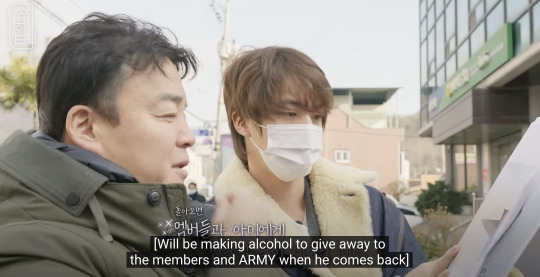
SPOILER: After chatting a bit a surprise guest sneaks in.

And here it starts with Jungkook:
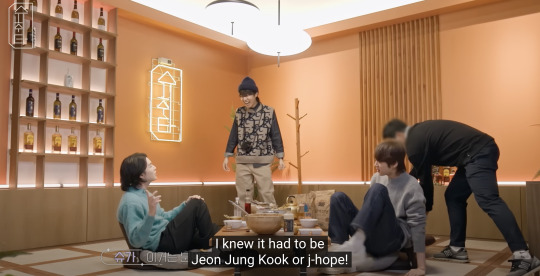
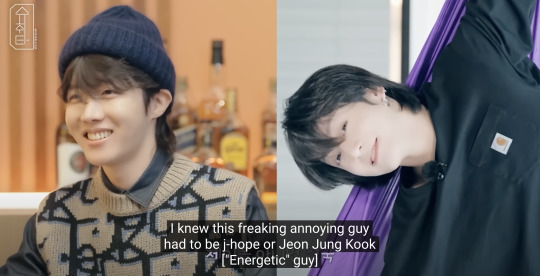
The three oldest chatted about getting nervous before performing while doing their solo projects and they mentioned how Jungkook did really great at the World Cup Opening Ceremony by himself (without the members). They are still very proud of their annoying little brother.
A topic they brought up was their award acceptance speech during the 2018 MAMA when Jin famously said they had considered disbanding... a lot of discourse has occurred because of this moment in Bangtan history...
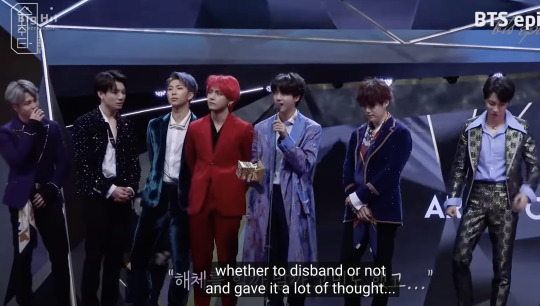
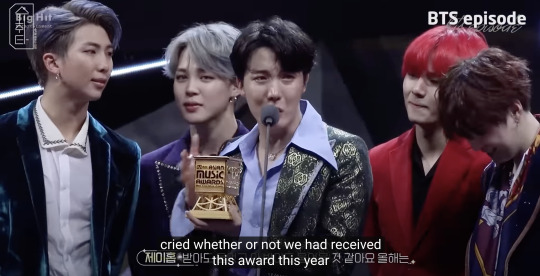
The real reason they even considered it: they were exhausted. After working nonstop with only 1.5 days off each month for three months straight, they were ready to give it up. The were told they had to work that way to make it... and they knew the company was right. Nothing good comes easy. When you are in the thick of it, it is hard to see the light at the end of the tunnel. The reward. But they never lost sight of it, even when it became a pinprick.
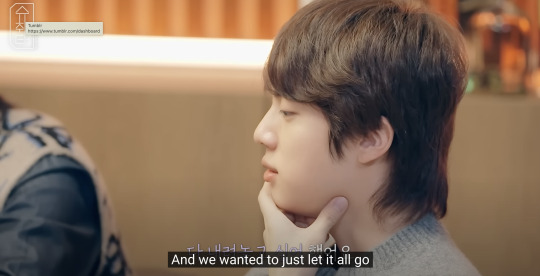
The timeframe was much earlier in the year and so by the time this particular award show came up, their difficult time had passed and they had made the decision to keep going. This is what is so special about BTS, they are as transparent as they can be. Hobi said even through 2018 they had thought of themselves as the underdogs.
But they realized it took grit and determination to be the best they could be. They went on to talk about how they are all driven whenever they are doing something they feel good about and used the Run BTS choreo as an example. Yoongi said even if they had individual schedules they all showed up an hour early to rehearsals without being prompted to do so, it was just a thing they were all compelled to do. And Jin said, "isn't that a given?" where Yoongi replied, "it is, for us."
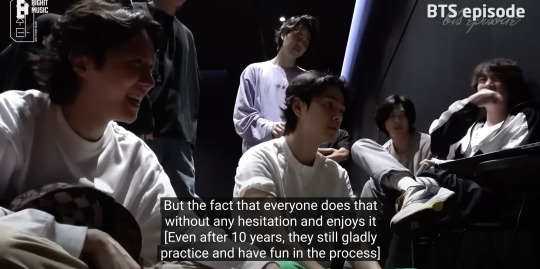
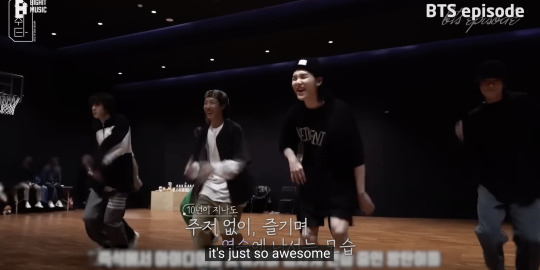
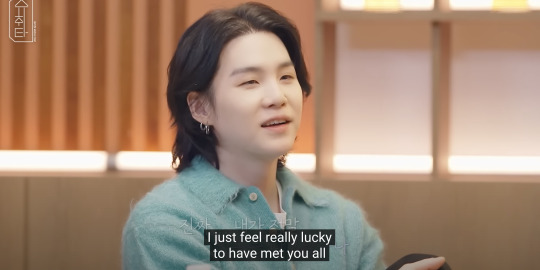
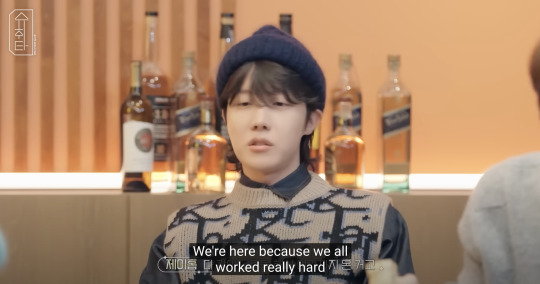
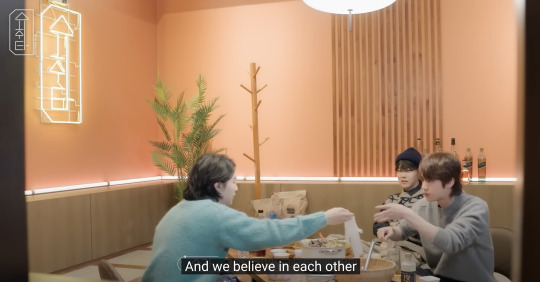
And that's the key. They believed in each other and in themselves. And Bang PD believed in them from the beginning and let them have at it to see how high they could go. They are still going and the heights reached so far were unimaginable at one time.
They have confidence and pride and belief in each other.
I absolutely loved this episode with the three of them giving us some personal insight into their dynamic. They spoke some about their different personalities and what they think they'd be doing if they didn't become BTS. Jin considers himself an "outsider" personality (someone who doesn't feel he fits in with anyone). He also does not consider himself a self-starter but will work really hard when told what to do (sounds much like JK). Jin said Hobi is the total opposite, and would easily find something to do. Hobi says he'd be doing something involving dance, and Yoongi said he'd be a songwriter.
And the way Yoongi described them as a group who didn't even know how to sing when they formed. Two amateur rappers, a street dancer, a theater major, a 15-year old middle-schooler, a good looking high-schooler and a modern dance major. He said it made no sense but they overcame all of that with ten years of hard work... "its just insane."
They talked about how they trained like pro athletes to learn how to breathe and sing while dancing the difficult choreography.
We got a major spoiler on this episode: Hobi will also appear in his own Suchwita episode and it will drop during the summer.
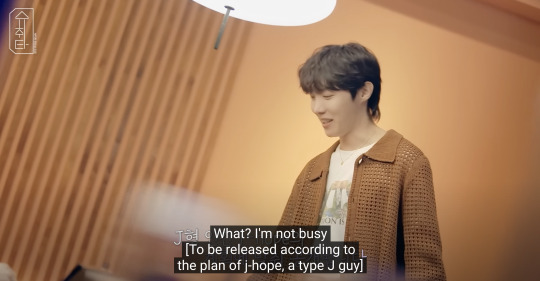

A type "J" guy?? June? July? Soon! Maybe the next episode! I am looking forward to more candid talk between Yoongi and Hobi. Maybe someone else will drop in unexpectedly.
They talk about their old dorms/living spaces. You know, I had heard that Yoongi was into renovating/remodeling and he mentions that he did this to their dorms. He said he had bidets installed in all three bathrooms. That is a really fascinating TMI don't you think?
The Suchwita editors sense of humor...
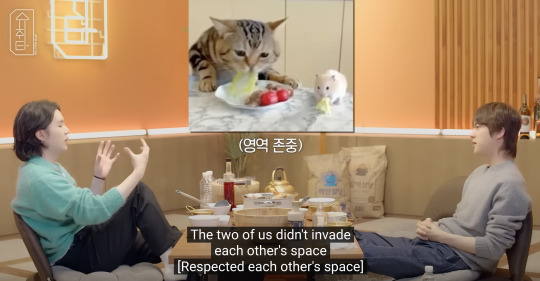
Jin says if he had to live with someone again it wouldn't be his brother, mom or dad, or Jungkook(?) or any other member, but he'd live with Yoongi again. AWWWWWW. These pictures made me tear up:
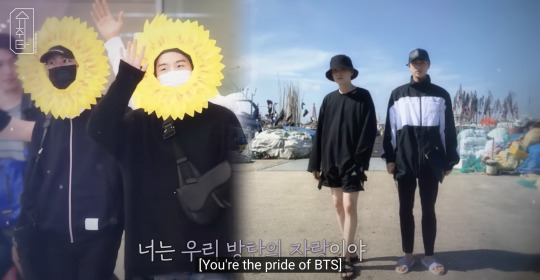

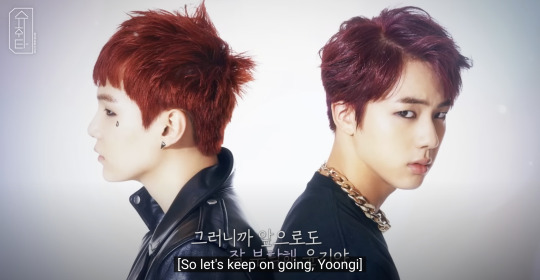
They started talking about Jin's enlistment and impending head-shaving. Then we get this pic with Jungkookie (he has been showing up a lot in this episode):
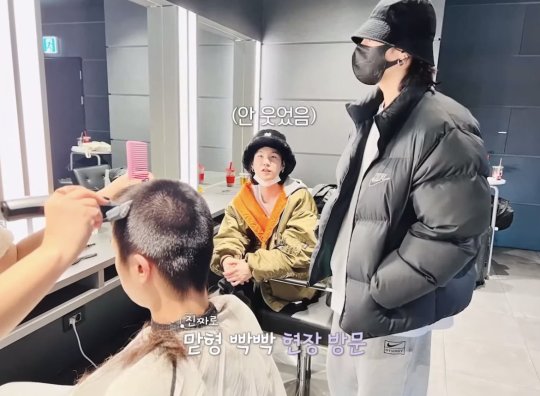
This supposedly happened on Sunday and his enlistment ceremony was on Tuesday. I thought JK and Yoongi were wearing the exact same outfits from Sunday as they were on Tuesday but JK was wearing black pants on Tuesday.
For Jin's "Time Machine" question answer he said he'd like to see the future in 2050 if they were still the same with each other and whether they'd still be living close together. And then Yoongi says this:
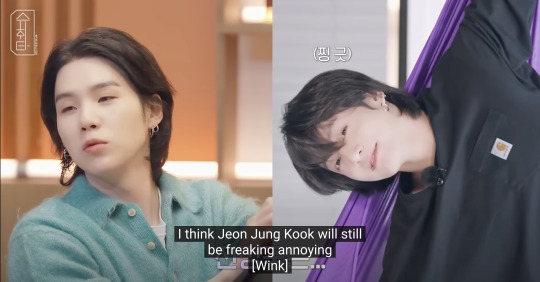
And Jin says "if we'd be sitting here talking (as a group) for 2 hours and then look over at Jungkook and ask him what his thoughts were, he'd say "What? What are you talking about?"
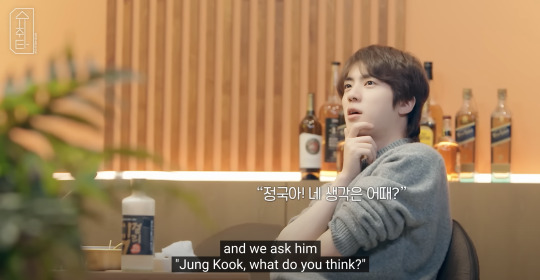
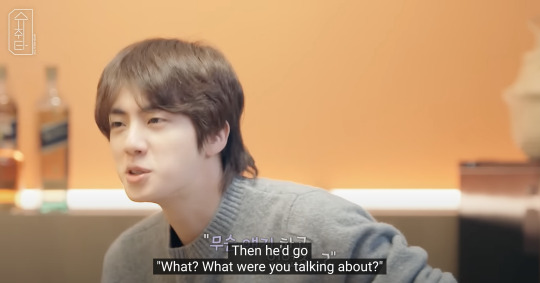

hahahahahaha omg LEAVE KOOKIE-POOKIE ALONE! do they know him through and through or what???? hahahahaha!
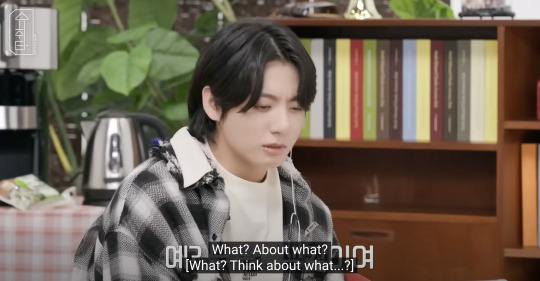
Yoongi said Jungkook will still be like that when he's 60 and that he hopes he never changes, and they both said they hope none of the members change when they grow older. AWWWWWW!!
Jin said his dream is to always be happy and that the key to happiness is doing what you love doing. At one time Jin had said doing music and performing with these amazing guys for a long time was his dream. Jin is just living the dream. I just know he is everyone's favorite person in his unit and on his base.
This episode of Suchwita was a really sweet, emotional one. Yoongi has been a major endorser for Bangtan forever and every time I see them reinforce their bond I get more excited for their future and what sort of music they will create. They understand each other professionally and personally and love each other unconditionally and its just a very rare thing to witness in such a harsh industry.
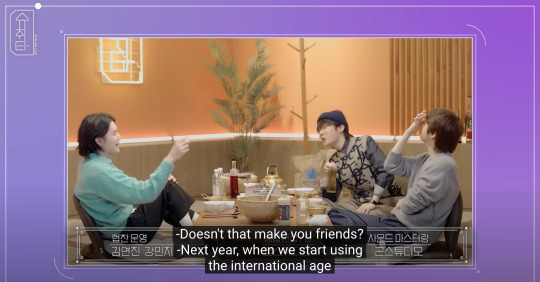
49 notes
·
View notes
Text
2023 Reading Log, pt 5
Is it obvious that my local library has lots of books about birds?
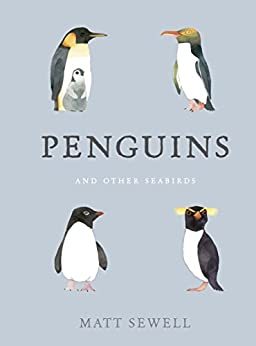
21. Penguins and Other Seabirds by Matt Sewell. This is a small book, hardcover, with color paintings of fifty seabirds and short informational blurbs about each. The blurbs are a combination of science and poetic writing, and are often anthropomorphic and occasionally judgmental (it’s okay gulls. I don’t hate you). The book is cute, but very short and faintly disposable. It feels like a gift book you get someone who you don’t know very well, but you do know likes penguins. Suitable for a bird-themed bathroom reader.
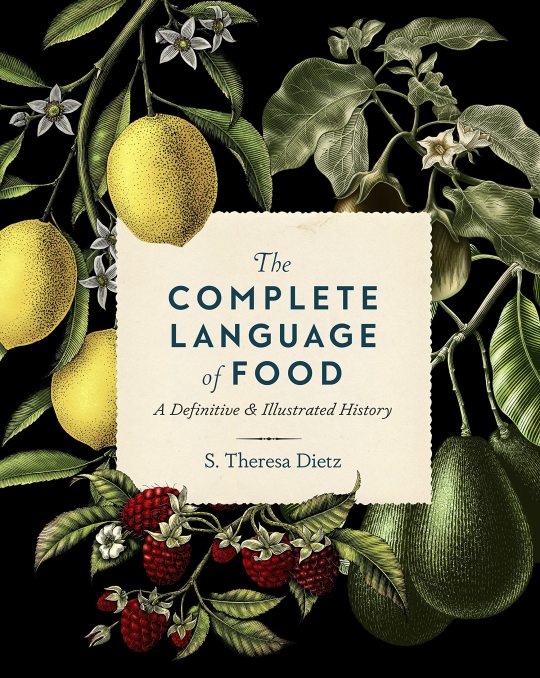
22. The Complete Language of Food by S. Theresa Dietz. This book baffles me; it feels like it was written by a space alien, or possibly a Dan Brown character. The “language” the title refers to is both symbolic and magical, and each of the foods is granted a laundry list of things it could possibly represent in a reference or a spell. These lists are sometimes nonsensical (or am I the asshole because I don’t know what “colorize” means in the context of magic?). Each entry is marked with symbols to tell if the plant has poisonous parts, or medicinal use, but said toxins and/or medicines may or may not be referred to in the actual text! The main text itself combines world cultural lore, magic and folklore, and recipe ideas in a seemingly random assortment. The book at least looks nice—good paper quality and color illustrations—and it actually has a bibliography. So it’s getting at least some of these ideas from somewhere. I am really confused as to the target audience, and what they’d hope to get out of it. I don’t think this book is for me. Although there’s at least two other entries in the series, so there is an audience out there.
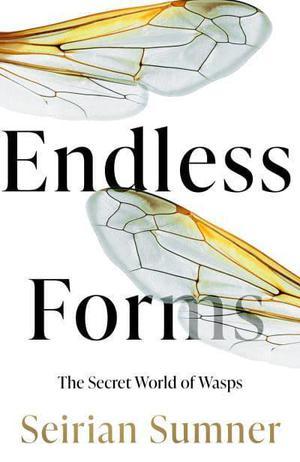
23. Endless Forms: The Secret World of Wasps by Seiran Summer. This book aims to give wasps a reputation boost from “the insects that are assholes” (thanks to @screamscenepodcast for that excellent summary of the popular culture view of wasps) to the vital part they play in ecology, our understanding of evolution, and the services they provide to humans. The book talks about the evolution of the Hymenoptera, and how both bees and ants are really just subdivisions of wasps that evolved in specialized directions. It covers some of the great naturalist observers of the 19th and early 20th centuries, like Fabre, and discusses what they got right, what they got wrong, and what we still don’t know. And in a very amusing change of pace, it frames the comparisons and contrasts between social wasps and honey bees as a drunken dinner conversation with a resurrected Aristotle. It even brings up The Wasp Woman! If you can’t tell, I really liked this book.
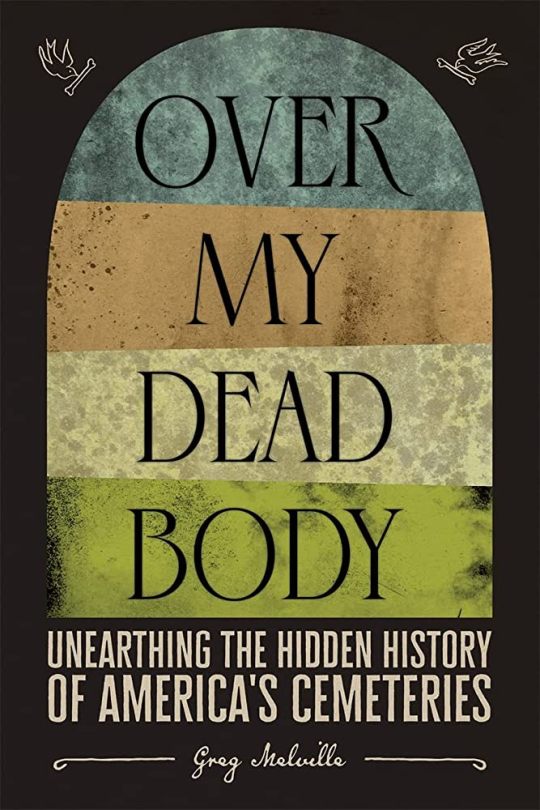
24. Over My Dead Body by Greg Melville. This is a history of the United States as seen through its cemeteries. The author is a big fan of graveyards, and each of the chapters is bookended with his personal experience of a visit, then talking about the history of the place and how it ties into greater themes in American history. Themes like colonialism, racism and segregation, the military industrial complex and the death industrial complex. The author blurb makes sure to point out that Melville is a “decorated veteran”, but any worries that this book was going to be jingoistic are dispelled basically immediately. He refers to Arlington National Cemetery, for example, as a beautiful, profoundly sad monument to the American god of death. I got this from the library, but I’m buying a copy for my mom for Mother’s Day. Because she likes cemeteries, not as some sort of weird threat.

25. Water Babies: The Hidden Lives of Baby Wetland Birds by William Burt. This is a photography book covering a hard-to-photograph subject. Baby water birds, including ducks, herons, terns, sandpipers and coots. The book is sorted roughly by taxonomic group, with pictures of each the juveniles and adult of each species, along with some commentary about the animal or the process of finding and photographing it. The book has a great sense of pacing—it’s arranged in a way that immediately hooks the reader (with grebe chicks, which are super cute and ride on their parents’ backs), and photos are arranged in space to allow for artistically pleasing contrasts (like turning the page from the scruffy chick of the purple gallinule to see the magnificent adult plumage).
#reading log#what are birds#birds#funeral industry#american history#wasps#entomology#magic#food history#plants
4 notes
·
View notes
Text
To Gun or not to Gun
Thoughts on the fundamental morality of weapons

this is literally me when im a tool of destruction from france fr fr fr france
[IMAGE SOURCE: Forces News]
In a post-WWII, post-nuclear world, peace has become a much bigger topic in geopolitics.
Before the destruction, caused by the industrialization of warfare in WWII, war was seen as a common and good thing in Western society.
Kingdoms would go to war, have thousands kill each other at max, steal some riches and be done with it. If a monarch wanted war, they could sell it to the public, due to the specter of war not being one of major or even total destruction.
Now, it's different.
We humans have biblical destructive powers at our command.
We have weaponized plagues. (Bioweapons that spread pathogens via animals, aerosol, contact etc.)
We have built fighting automatons. (Drones with bombs)
WE COMMAND A FRACTION OF THE STARFIRE (nuclear weapons utilize nuclear fission and fusion, processes that occur naturally in the universe on a massive scale and are the reason stars exist)
And yet, we haven't shook our desire for conflict. Still, conflict is in our nature as persistent predators.
With such threats of total annihilation, geopolitics has become a lot more complex, with efforts centering around avoiding and limiting conflict.
Peace used to be a concept that was only pondered and acted on on a personal scale, now it is on an international scale (except for russia).
And thus, oh-so-often do you hear discussions about the military-industrial complex and its major role in perpetuating war, by giving people the means to fight them.
But, I believe the discussion about it actually comes from a limited, Western perspective.
First off, the Western superpower (United States of America) and great powers (United Kingdom, France and Germany) are not the only places where weapons are produced on a major, Industrial scale. The sentiment that they are stems from Cold-War-and-beyond anti-Western propaganda, which abuses the Western exceptionalist mindset and intrinsically connects war with capitalism, even though modern capitalism arose in the 1800s, and war is a much older concept than that, and despite all the wars waged by anti-capitalists.
For example, no loyalist to the Chinese Communist Party has a right to call warmongering an exclusively Western or capitalist thing, as, out of the five deadliest wars in world history, three were Chinese civil wars.
Another example is how many militias, paramilitaries, guerillias and other militant non-state actors use Soviet weaponry. The Soviet Union was, after all, the place where you had more tanks than food.
This is something that upsets me in the Western discussion of warmongering:
Once again, viewing the world from a Western exceptionalist perspective, Westerners often somehow disregard the roles of non-state actors in the starting and perpetuating of wars.
People, just because they're not the strongest, doesn't mean they can't desire war, or are incapable of starting and perpetuating wars!
(Most non-state actors are actually proxies of state actors anyway)
This is, for example, also why I advocate for more shooter video games to use mercenaries as the enemy soldiers who the player can mow down at their leisure, as, in real life and modern times, becoming a mercenary is always a choice, and one indicative of nonexistent morality at that.
Since they're non-state actors, you don't hear much about them on Western news or in political discussions, but mercenaries are arguably more of 'War Merchants', people whose business is war, than Western arms companies.
The Western arms companies may be similarly immoral,
but the reality of their selling of weapons to all sides of any conflict they can contact is the same as with any other commodity in an age of international trade:
They sell to whoever wants to buy, and whoever they CAN sell to.
Technically, the international sale of, say, German-produced guns works the same way as that of German-produced cars.
I, for one, haven't heard anyone talk about the Volkswagen-BMW complex.
Many Western countries are also democratic, which means that the economy, and that includes arms companies, often has more of an influence on the government than that the government has an influence on the economy.
In russia or China, the opposite is true:
Guns and bombs are only produced, sold and used when the Dear and Very Democratic Dictator for Life says so.
Ultimately, a weapon may be a tool of destruction, but in and for itself, it is morally neutral.
The phrase "It's the guns that kill people" is only half true.
Being man-made tools of destruction, weapons only kill anything and anyone if they are used as such by a person.
Yes, there can be lethal accidents, but you also get those in environments with entirely peaceful tools. Often more so than with weapons, as peaceful tools are underestimated in their destructive capability.
And this leads to my whole point:
While some tools are, by design, more peaceful than others, they can always be used in a destructive way.
A hammer can be used to build homes, or to break a person's skull.
Nuclear fission can be harnessed to produce a ginormous explosion that kills tens of thousands, or to produce electricity to keep tens of thousands warm and safe.
I think we Westerners have enjoyed peace for such a long time that we have forgotten how inherently dangerous the world is, and how fragile peace is. So, we no longer appreciate it.
This isn't to advocate war, but to see war and weapons with more nuance.
I will leave you with a quote from Mahatma Gandhi:
„I do believe that, where there is only a choice between cowardice and violence, I would advise violence… I would rather have India resort to arms in order to defend her honour than that she should, in a cowardly manner, become or remain a helpless witness to her own dishonor.“
#politics#political discourse#war#warmongering#weapons#guns#arms#industry#arms industry#military#miltary industrial complex#paramilitary#mercenaries#militias#geopolitics#conflict#peace
0 notes
Text
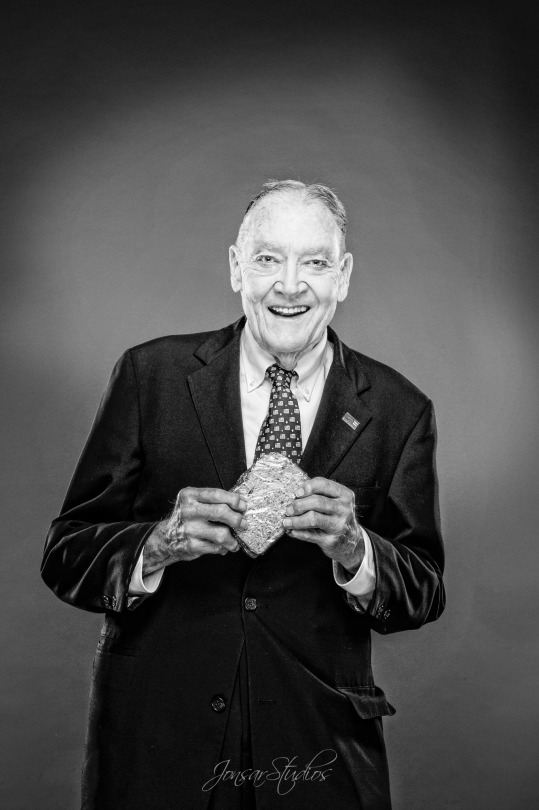
📖September 20, 2023
🦈Continuing the topic about the creature with a claim to the mind of the AFK Alfa-VTB Systema, which gloriously entered itself into my life, killing my family members, and to which, as in a corporation of monsters, my children's socks were poured up (shares in my companies, my apartments, inheritance, cars, dogs, personal belongings, etc.), I want to express my human position on one important issue.
Sometimes I wonder if everything could have gone differently in my life, and unfortunately every time life gives me new evidence that I was not given to live my life differently, because of my origin. My origin sets the direction of my whole life, and I can’t live someone else’s life. Among my relatives, I think I'm very lucky that I'm still alive so long. My heredity is bad in only one thing - almost 100% guaranteed violent death. In everything else, I am very grateful to God for being born in my family and for learning about my pedigree. Do I regret what I've lost in these few years of struggle to save my own life and life of my dogs? The question is rhetorical. All my life I've lived on the principle of "refuse to get." There were more than enough examples when following this principle led me to stunning success. It's a kind of strategy on the contrary - if you do it like everyone else, you won't survive in the red ocean. I do not regret material things, in the end, having learned that all of them were flooded mustard gas - I want to laugh with all my heart at those who stole them. If you consider how much and what I've lost in terms of things in the dry residue, it's a lot, but it hurts me in a completely different way. Having an absolutely amazing family (of course I'm talking about real relatives, not Orekhovskaya gang’s bastards), I actually lost the opportunity to communicate with my relatives. All my direct ancestors, who transferred me such a cumulative stock of genes, with the help of which I actually survived this nightmare, they died already. You can buy a new car, repair a house, a computer, fix all material losses. The only thing I regret, which is irreversible, is what these Orekhovo-Cocosovo bastards and their bosses did - they deprived me of communication with my family while its members were alive. I will talk to my family members never. Can you imagine what do I feel? I lost the greatest unrecoverable value - human communication with my family while it’s members were alive. The second thing that hurts me a lot is that these scums poisoned my dogs. And finally, the third is the shame with which these scum covered my family, entering into our pedigrees seashore with fake passports and forged genetic tests, like this Orekhovskaya family of parents-tourists.
At some point, I stopped being afraid of physical death. I perceive it as an inevitability that overtakes every person in due time, and which for me means reuniting with my family, which I personally never knew because everyone except me died. What feelings did I feel when I fully learned my ancestry and origin? Quite simply - the desire not to disgrace my family and live my life with dignity in accordance with the principles that my family professed. They are expressed in two words - to serve the Fatherland. The only aspiration that drives me in my projects is not to drop the honor of my ancestors and live my life in such a way as to shamelessly write my name in the history of my family on a par with my direct ancestors: heroes who created great states and performed military and personal feats. For me, this is the most important motivation - to be a worthy representative of my dynasty. Everything else is secondary.
👩💻More stories are on my website:
https://pin.it/3QJeAgE
🦈🖤🎞Follow me:
#meggi #meggifromhouseofskjold #ceoboost #meggifromskjold #daughterofskjold #sisterofgoering #meggigoering #meggigöring #raevskayarepnina #annamariaserafimaraevskayarepnina #мэгги #мэггигёринг #раевскаярепнина #аннамариясерафимараевскаярепнина
#meggi#daughter of skjold#sister of göring#anna maria serafima raevskaya repnina#boostcmg#hasheight#john bogle#hateful eight#meggi göring#meggigoering#raevskayarepnina#Herman goering
0 notes
Text
Strand 101:
1. Sociology
- It is a social science that focuses on society, human social behavior, patterns of social relationships, social interaction, and aspects of culture associated with everyday life.
- Example : It is a combined system of moral and political philosophy, or a sociology dominated by the idea of the state.

2. Literature
- It is broadly any collection of written work, but it is also used more narrowly for writings specifically considered to be an art form, especially prose fiction, drama, and poetry. In recent centuries, the definition has expanded to include oral literature, much of which has been transcribed.
- Example : Her courses made her great in literature.

3. Politics
- It is the actions or activities concerned with achieving and using power in a country or society.
- Example : Some of the people are being biased when it comes to politics.

4. Religion
- It is a set of beliefs concerning the cause, nature, and purpose of the universe, especially when considered as the creation of a superhuman agency or agencies, usually involving devotional and ritual observances, and often containing a moral code governing the conduct of human affairs.
- Example : There are over 4,000 religions in the world.

5. Law
- It is a rule or set of rules, enforceable by the courts, regulating the government of a state, the relationship between the organs of government and the subjects of the state, and the relationship or conduct of subjects towards each other.
- Example : As a citizen who lives in a society, you must known the law to avoid punishment.

6. History
- Is the study of change over time, and it covers all aspects of human society. Political, social, economic, scientific, technological, medical, cultural, intellectual, religious and military developments.
- Example : Philippines are rich when it comes to history.

7. Government
- It is the political system by which a country or community is administered and regulated.
- Example : You must known every position in Government because it is important to know because there is most powerful.

8. Culture
- It is the characteristics and knowledge of a particular group of people, encompassing language, religion, cuisine, social habits, music and arts.
- Example : Philippines are rich in Culture.

9. Community
- It is a social unit (a group of living things) with commonality such as norms, religion, values, customs, or identity. Communities may share a sense of place situated in a given geographical area (e.g. a country, village, town, or neighborhood) or in virtual space through communication platforms.
- Example : It is important to leave in a community that will give you peace and happiness.

10. Communication
- It is the transmission of the message from sender to recipient can be affected by a huge range of things. These include our emotions, the cultural situation, the medium used to communicate, and even our location.
- Example : As a person, communication will give me freedom to speak and deliver what I want to say.

References
1 note
·
View note
Text
I already reblogged the first part of this thread but seeing this other reply and the talk of the crumbling foundations reminded me of some pretty relevant ideas that i would really like to add, if y'all don't mind!
Though mandatory disclaimer: Hoyo can write good stories but at the end of the day it's still a video game, and as a company they do have incentive to avoid over-complicating things too much. So I don't know how likely it is that they'll actually give us a deep dive into a possible collapse of the IPC... but it's still fun to theorize about so I'll go ahead anyways, lol
First, I wanna quote this part:
He wanted to speak to the higher up, but got Jade instead. And when he boasted about only needing 30 tanba ... to out-do the IPC... And Jade jumped onto that so fast. Giving him all that, and more...
This followed by the comment about cracked foundations got me wondering, if perhaps Jade might be aware that Aventurine has an anti-IPC ambition, and if she might actually want to play a role in that as well. Not subservient to him of course, but rather as a cooperating party.
The thing is that organizations are incredibly complicated things. If even a small group project of a handful of people can run into problems due to conflict of interest, what happens when you scale that up to hundreds, thousands, or millions of people? The way that these organizations maintain some semblance of order is usually through managing conflict of interest, and making sure that it is in peoples' best interests to work together.
But this manifests in different ways in different organizations based on culture, politics, legality, history, etc.
For example, the Soviet military had some pretty infamous problems with corruption, which carries on to this day, and Perun had a great video about this- it's a system where everyone is incentivized to lie, from the lowliest grunt to the highest generals of the military. As long as everyone keeps up the lie, then the system goes on working as normal... so long as the system isn't challenged by minor troubles such as the reality of waging war.
But in another organization, that might not be the case. In a nation with a more open and democratic process of accountability, it would be much harder to get away with blatant corruption. Sure you can still have corruption and conflict of interest, but if lies and cover-ups are punished accordingly, and the alternative route of being honest still pays enough to be worthwhile, then people will be more honest. This would've been an organization like Boeing in the past, but if that system of accountability begins to degrade, then you end up with "mistakes" like... the door of an airplane flying off mid-flight.
But in these organizations, these sorts of problems result from the interactions of countless individuals each with their own agenda.
In the Soviet military the lowliest grunt might want to provide for his family; the grunt's officer might want a raise, the officer's commander might want a promotion, the commander's general might want a spot on the cabinet, and the members of the cabinet don't want to get tossed out the window of an apartment building by current Soviet leader. So the grunt lies to the officer lies to the commander lies to the general lies to the Soviet leader, and you end up with countless lies all the way up to the top.
Likewise, if the maintenance workers in Boeing are struggling to make deadlines and KPIs, then they might have a personal incentive to cut corners. Skipping "not so important" steps in maintenance or review, for instance. In a functional system their supervisors would be incentivized to prevent these corners from being cut, but if the supervisors stand to gain from this process of cutting corners, then they might go along with it. And if the this continues up to the highest level of the command, then you end up with board members and shareholders who willingly turn a blind eye to dangerous practices for the sake of keeping the stock price going up, up, up ad infinitum.
To bring this back to the IPC... I have no doubt that the IPC could be in a similar spot. We've already seen how various low-level workers of the IPC are often in a tight squeeze, pressured to perform at any cost, often leading to rash decisions. Some folks like Topaz might be more level-headed and diplomatic, but if that sort of "success at any cost" mentality is pervasive throughout the IPC, then it might be reaching all the way to the very top.
That kind of system works as long as everyone keeps subscribing to that belief, but if that system is shaken by a core event (like a 2-year-long "3-day special military operation", or aviation disasters and safety mishaps), then the whole thing stands to collapse. The lowliest grunts are probably too stressed to care much about the big picture, since they're concerned with their immediate well-being and the well-being of the people they care about.
However, a higher-up like Jade would almost certainly be aware of these sorts of problems. And odds are, Jade wants to work in Jade's interests- not the IPC's interests. Her personal interests likely line up with the IPC's interests for now, but if Jade sees the writing on the wall and if the IPC is vulnerable in any way, she stands to gain from positioning herself in a way such that she minimizes personal damage and maximizes personal gain from any collapse.
Another thing about these big organizations is that they're not entirely monolithic entities. They're made up of many different sub-units, and these sub-units can split apart from one another and recombine in different ways.
For this I actually have a fictional example, from Star Wars lore: Admiral Thrawn. After the second Death Star got destroyed and the Emperor was killed, the Empire pretty much collapsed and the New Republic that took its place seized the initiative and took down Imperial remnants. But Admiral Thrawn was a powerful and respected figure that also had a much bigger brain than the egotistical Sith lord in charge of the Empire, so when the Empire collapsed he was capable of consolidating power amongst Imperial remnants. So when challenged by the New Republic, he had a strong industrial base and loyal followers to support him, and he was able to fight and negotiate with the New Republic on equal terms. The organization as a whole fell, but through careful planning and decisive action, Thrawn carved his own slice of the pie and kept order in his corner of the galaxy.
As for real-life corollaries, Perun yet again has a video on this aspect, this time featuring factionalism in a certain modern military. This is where I'm getting the idea of "incentives" from, if you don't want to watch the whole thing then the segment starting at the 4:30 timestamp is at least worth a watch for the explanation of incentives.
So again, back to the IPC: a collapse of the IPC doesn't mean that every IPC building spontaneously explodes and all the IPC uniforms in the galaxy just burn away into nothingness. Many of the assets of the IPC, both physical hardware like buildings and ships as well as intangible concepts like hierarchies and financial resources: those will remain. In a potential collapse scenario, it'd be a sort of chaotic free-for-all where various individuals at different levels of the power hierarchy move to consolidate their own power wherever they can.
Again, being a Stoneheart, Jade is likely aware of this. So while I seriously doubt Jade is gonna be a good Samaritan and stand in a picket line with a "F*** the IPC" sign, I do believe that she would be willing to act against the "IPC" if the IPC as a whole begins to collapse. She could instead remain dedicated to her "slice" of the IPC: the officers and employees that are loyal to her, partnered with her, or under her command.
This can also explain Jade's willingness to accept Kakavasha's wager: she might see him as an ambitious individual with a lot of potential that could be of use to her. Best-case scenario (for her) would be that he ends up largely subservient to her, and worst-case scenario (again, for Jade) would be that he becomes independent of her but could still work with her as a partner in the future. And so far it seems like the latter is the case.
So if there truly is instability in the IPC, if Aventurine truly has the potential to shake it from the top-down, and if Jade is fully aware of this... then why shouldn't she work with him? It depends on the details: if the math pencils out in Aventurine's favor, then Jade is incentivized to support Aventurine in his cause. But if the incentives remain such that Jade benefits the most from an intact and stable IPC, then she would be incentivized to stop any of Aventurine's schemes.
Knowing Mihoyo and how they write their characters (see: Arlecchino), I suspect it might be the former. I can see Jade being an absolute asshole and terrible person, but still doing just enough "good" by shaking up the IPC that we could end up allied with her to some extent.
I don't think this is a bad thing, just to be clear- I just think that it's not so likely that Jade is gonna be a pure evil antagonist that has no "redeeming quality". She might still be a terrible person, but if we apply a "the enemy of my enemy is my friend" logic here, then we might be able to consider Jade an "ally" in a conflict with the IPC, and if that's the case then that might be good enough for marketing her as a not-entirely-evil person.
And as for Topaz... I'm not so sure whether she'd be the kind of person to exploit a collapse of the IPC like Jade or Aventurine would. But knowing her genuine desire to do good (despite being part of a shitty megacorp), I can see Topaz somehow working alongside them anyways if they present her with the opportunity to follow her beliefs without having to remain firmly part of the existing IPC order.
If this actually does end up happening, it's gonna be really fascinating to see Topaz reacting to all of this, and to see what choices she makes when weighing her own security and prosperity against that of her co-workers, her partners, her underlings, and her own beliefs.
These Aventurine, Topaz and Jade comparisons are getting out of hand…
As much as I adore both of them, I think it’s very disingenuous to compare Aventurine and Topaz’s lore and be like “but they are the same!!!! If people like Aventurine and dislike Topaz that’s just misogyny!!! and like… no?
Topaz’s whole thing is that she doesn’t know the extent of the IPC’s evil, and believes that what she’s doing is genuinely the right thing to do. Even if she never had a choice in joining the IPC, she (incorrectly) believes what they did to her and her planet is justified, logical and moral, and for those reasons she stands with them. Part of this is likely IPC brainwashing, as she was probably very young when she became an indentured servant to them, and someone living on a planet on the brink of destruction would likely view anyone who stepped up to save them as heroes (imo the IPC likely waited for the point of no return to establish contact so her people had no other choice to except).
However Topaz got best end of the proverbial stick, her planet and its people were deemed useful by the IPC, and didn’t fight back, even if in the end they were still exploited.
Unfortunately, we have seen through Boothill, Belabog and Aventurine what happens when that isn’t the case.
Boothill’s planet got bombed and people genocided because they had a resource useful to the IPC, but were unwilling to cooperate with them or hand over their home, so the IPC decided to eradicate them.
Belabog had a debt owed to the IPC that was ridiculously high and very unfair to expect them to pay back, and had Topaz not convinced the higher ups to give them some time (which she got demoted for), the IPC would have taken Belabog by force
That leaves us with Aventurine, whose story is in no way on the same level of bad as Topaz’s. Unlike her, he has witnessed and experienced firsthand the truly awful shit the IPC can do.
They took custody of Sigonia and promised to offer the Avgin aid in their fight against the Katacans, at the very least protect them from harm. (Sidenote, since the IPC held control over Sigonia, they should have stopped the fighting in the first place). However, they simply stood by and did nothing, resulting in the deaths of around 6,000 Avgin, with around 3,000 went missing (or injured, I don’t remember, either way it’s bad).
But wait! It gets worse! Aventurine when he was still known as Kakavasha referred to the IPC as “the men in black/the men in black suits”, and his first master says he bought Aventurine from “the men in black/the men in black suits”, likely mocking the way he referred to them. Therefore THE IPC TOOK PART AND LIKELY EVEN CREATED A FUCKING SLAVE TRADE IN SIGONIA
Look being made into an indentured servant isn’t fun, but idk personally I’d take that any day of the week OVER BEING ENSLAVED
That’s not even to mention how horrible of a reputation Sigonian’s have in the galaxy, one likely spread by/resulting from the IPC themselves, as at least on Aventurines planet they do not have the mobility to make a name for themselves. (Honestly it’s a mini theory of mine that Aventurines scam is what partly contributed to this reputation, and his status as a slave is something the IPC conveniently left out in their broadcast about it-)
But, you might be saying, didn’t Aventurine have a choice to join the masked fools and leave the IPC, isn’t he free now? And to that I say, it’s complicated.
Considering the amount of suicidal shit Aventurine has done while being part of the IPC, he clearly hasn’t been having a fun time as a member of one, so why does he stick around, especially with the Fools invite? Even if he was a slave, does that absolve him of the crimes he’s committing now? What could justify his actions?
Revenge, plan and simple.
This is going to delve into some spoiler territory for the end of the Penacony 2.2 quest, something which I didn’t feel like mentioning earlier because I’m sorry but everyone and their mother already knows Boothill’s lore. Now, let’s get into it.
Aventurine accepts Jades offer to join the IPC, and when he becomes a Stoneheart, the first thing he asks about is the fate of the Avgin, to which he then learns that besides him, they are all dead. You see, from birth Kakavasha was pushed onto a pedestal as the savior of the Avgin, but now that there are no more Avgin to save, his primary motivator in becoming a Stoneheart (beyond not being enslaved anymore) is gone.
So what does he do now?
Simple, try to kill the motherfuckers behind it.
That’s why he takes on such risky gambles still, and why he wagers and wants Diamond to promote him to rank p46. The higher Aventurine gets the closer he gets to his goal of taking down the IPC for good.
Which is why his meeting with Boothill is so meaningful. I think Boothill is going to “kidnap” him and together they are gonna take down the wicked bitch that is Oswaldo Schneider for his literal crimes against humanity.
Mark my words, an IPC downfall is going to happen, and I think Topaz, Aventurine, Boothill and Ratio are going to be at the forefront of it.
However, Topaz and Ratio (and by extension the rest of the galaxy) have to learn/realize the true horrors of the IPC (although I can sense Ratio doesn’t really like them, and he’s learned a lot from Aventurine, I doubt he knows the full extent of the situation or is in any way happy about it). Therefore? Topaz mental breakdown arc? Ratio lore? PLEASE??!? The IP3 compliment one another so well and god I can’t wait for that to come to fruition.
I really want to see a Topaz and Ratio centered story leading up to an IPC smackdown, and I think we are gonna learn a lot more about how shitty they are in the later half of 2.2 and in 2.3 when the interlude and Jades release arrive.
As for the aforementioned Jade, she’s gonna need a Aventurine squared amount of trauma or reasoning behind her actions to seem in any way sympathetic, because right now she just seems like an evil bitch (in a semi good way, I will always respect the commitment to the bit) who loves her job and would make Machiavelli weep over how hard her ends are trying to justify her means.
#welp i really didn't expect to be diving into discussions of organizational hierarchy in a tumblr thread about honkai star rail#but here we are folks! thanks for coming to my HonkaiTalk#i also read some of the other comments and replies on this thread and absolutely love this discourse#organizational politics can be quite interesting if you attach enough pretty faces to them ngl#hsr aventurine#hsr topaz#hsr jade
659 notes
·
View notes
Text
In light of all that we’ve learned with this most wonderful final season, some people have asked me to reassess Hordak’s backstory monologue. To see how Hordak’s narrative fits with what we now know about his home. To try to discern exactly what its discrepancies are, and why.
I’m going to do that! But before I do, I would remind everyone: this is a little difficult to fully untangle because, given that Hordak is not a main character and thus does not have the focus that we’d like, we really don’t know a whole lot about the Horde in terms of function, social roles, and general history. So this is going to be very much limited by what I can glean from exactly what the show gives us.
That said, it’ll hopefully still be interesting. So!
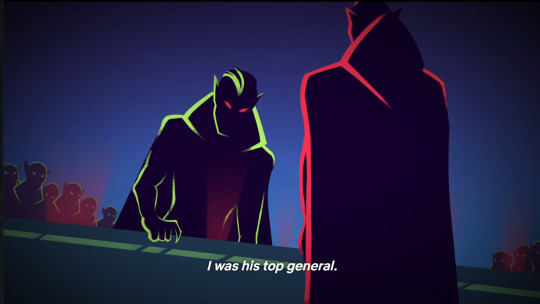
During season three, after recovering from his syncopal episode, Hordak describes to Entrapta what he is, what he was, and how he came to be on Etheria. He describes himself as a defective clone who, once upon a time, was the top general in the galactic Horde. When his defect became too much of a burden, he was apparently demoted, sent to the front lines to fight until death, and arrived on Etheria by way of unexplained portal.
This is what Hordak tells us, and, as far as we know, he’s not lying. Hordak, as portrayed in the show, is a very honest person, both in his own actions and in the actions he expects of others. He greatly dislikes deception and does not appear skillfully capable of it himself (save for that one time). Knowing this, we generally have to assume that, in his own mind, what Hordak is saying is true.
So. What gives, right?
After all, once we see the galactic Horde in action, we learn that it is a played-straight, honest-to-the-gods cult. There’s nothing distinctly military about it. It’s not a bigger, grander version of Hordak’s Etherian Horde.

It is a cult with a god-brother-creator at the helm, commanding countless identical acolytes who live their lives in slavish devotion to their master. There do not appear to be any ranks. We hear nothing about any generals, let alone a “top general.” There doesn’t even appear to be a need for anything like that, because Prime doesn’t seem to really delegate to his brothers in a way that singles them out or relies on real autonomy from them.

He can, after all, read their minds at will and slip into their bodies whenever he fancies. If he needs to make a decision about a battle on a planet at the other edge of the galaxy, he can just take over a body on that planet and make said decision himself. Or, at the very least, enter the relevant clone’s mind and influence the decision as needed. He doesn’t need, and certainly doesn’t appear to tolerate, clones taking their own initiative.
So, again: what gives? What does Hordak mean by “top general”? Why does he think he has this elevated role when we can see that Prime considers all of his clones the equivalent of faceless bodies to be used a he likes?
Well, while we will likely never know the full truth, given the lack of Horde background detail, we can safely assume some things from what canon shows us.


Namely that, while all clones appear indistinguishable and do not seem to have named rank, there are definitely clone positions that work more closely with Prime than others. His attendants are one example. Those who are in his throne room feeding him information while he is working are another. (Hordak actually appears to be one of these, at least while Prime is trying to hack the Heart of Etheria, when Entrapta is captured.) And then, of course, there are the chosen vessels that will one day house Prime’s consciousness.
All of these positions can likely be occupied by any clone, with bodies switched out as needed (likely what happened when Hordak got sick). I doubt that individual clones have any sort of real rank. Prime knows this. Hordak and his brothers, I suspect, may not fully understand it.
Rather, I would not be surprised if Hordak, deceived and indoctrinated into believing things about himself and about Prime that are not true, misinterprets the nature of his purpose and the truth of his relationship with his Brother. He believes that, fulfilling whatever role he was fulfilling for Prime, he was a general, an individual of note, an individual that Prime specially valued. Perhaps he fulfilled the role long enough that, in all but name, it became “his.” Perhaps he even fulfilled it well enough that Prime praised him frequently, cementing this unfortunate delusion. Perhaps Prime gave him legitimate favor - a false thing, of course; simply a controlling tool, but Hordak did not realize that.
Without canon confirmation, we can really only speculate, but these ideas seem reasonable.

Details aside, the point of the matter is that Hordak sees himself as “top general” because he sadly doesn’t understand that he is an interchangeable piece of a utilitarian machine. He truly thinks that he has this coveted position, that he is particularly useful, special, of great value. It’s a tragic misunderstanding that simply fuels his misguided devotion to Prime and prevents him from seeking freedom when he is given the opportunity.
It’s something, I think, that people in very controlling religious organizations often end up thinking: that they are especially valued, worthy in some way that others are not. It’s part of how the organization controls them.
By the by, there is also the theory that Hordak has suffered memory erasure before and is thus doubly confused, filling in blanks with fantasy, but given that we have no direct evidence of that, I’m not really going to go into it; it’s a popular bit of speculation, though.

Now, however, let us examine a different aspect of this. Labels aside, delusions aside, we are left with another conundrum: however Hordak interprets his position, it is very clear to us that said position does not actually offer the power or respect that a legitimate high military rank would offer. It does not appear to provide Hordak with any special treatment.
Once upon a time, back when we first learned of Hordak’s backstory, it was somewhat assumed that the position would do something like this. Numerous fans speculated about how it might be a position that gave a clone dominion over others, or over their own personal ships or planets; some fans suggested that it might give a clone the right to a name. Now, of course, we know that none of these speculations are true: all of Prime’s clones are essentially interchangeable; all are part of a hive mind that eliminates the need for certain clones directing others; no clone is allowed a name, no matter what their current job might be.

So. What, exactly, is Hordak practically gaining here? Despite this position appearing to hold zero effective esteem, despite it necessitating Hordak giving up his self and his autonomy, it is abundantly clear that he desperately wants it back. Why?
What about this position, whatever it may or may not be called, would provide Hordak with this sense of value, of specialness, of personal worth? After all, Hordak may be deluded, but he’s not stupid; even indoctrinated, he can tell that he doesn’t hold dominion over other clones, or have a right to his own name. He can tell that he doesn’t receive any functional privileges, that his own sense of value doesn’t translate into anything that you or I would think is “worth the price of admission,” so to speak.
In light of that incredibly steep price, what does this position offer, in a world where military rank appears irrelevant? What does it offer, in exchange for Hordak’s name and his bodily autonomy and his freedom? In short, what does it offer that makes Hordak think it worth sacrificing so much for?
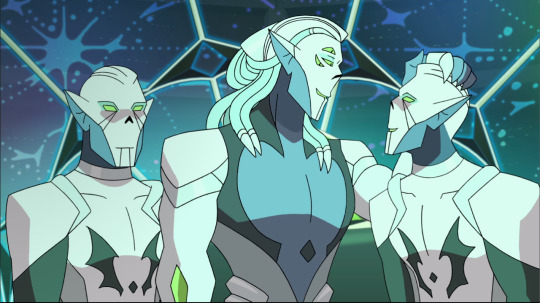
Well.
It offers closeness to Prime, doesn’t it? It offers the chance to work near him, to bask in his presence, to be spoken to and looked upon and touched by him. It offers the chance to receive his praise, personally. It offers the chance to perhaps - hopefully, wishfully - receive his love.
Because that’s what Hordak really wants. Not dominion over others, or a fancy military title. He wants that emotional connection. He wants that approval and validation. He wants love. And for so much of the series, for so much of his life, he believes that love comes only from Prime. That working closely with him, being of use to him, will provide him with that sense of belonging and acceptance and affectionate care that he hungers for. That it will make him worthy and loved.
(There’s a line in the deleted Entrapdak scene, where Prime calls Hordak the “most unloved and unworthy” among his brothers that really cements the idea that worthiness is synonymous with love within the galactic Horde)
This is what marks the position as “special” in Hordak’s eyes: it is special because it stands the greatest chance of providing him with Prime’s love.
All of it is a lie, of course. Because Prime only “loves” his brothers as extensions of himself, and even then, only if they are physically useful to him. Once Hordak starts to lag behind due to his illness, he is quickly removed from Prime’s presence and sent to the front lines, destined to fight until defect or battle kills him. And yet it is a lie so powerful, and the clones’ need for Prime’s love so great, that he is able to use it to control them even when they are separated from him. To the point that a sickly clone trapped in a shadow dimension will forgo freedom in his desperate bid to feel wanted and treasured by his cruel god.

Eventually, thankfully, Hordak finds a true version of the connection he craves, someone who looks at him and acknowledges him, values him and loves him as he is, without him needing to prove himself useful. He finds Entrapta, and she provides that love that he sought from Prime.
This is why, even though Hordak actually ends up working in Prime’s throne room again, ends up close to him once more, he breaks free from control and kills his Brother. Throughout season five, Hordak remembers Entrapta. He remembers how she makes him feel. He remembers her love... and he realizes that it is not the same as Prime's. It is sincere. It is unconditional. It accepts him as his own flawed person, rather than the perfect drone Prime wants him to be. It is deeper and more true and more real than the hollow sham Prime offers.
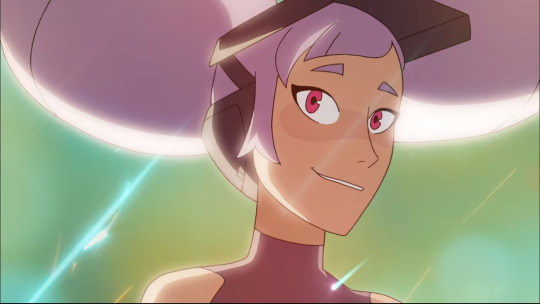
And so Hordak rejects this once-coveted position, rejects Prime, and frees himself. He makes the choice between a false, controlling “love” and the real, heartfelt thing. He makes the choice, and he chooses Entrapta.
In the end, the greatest disconnect between what Hordak tells us in season three and what is true isn’t the word “general,” or even the cruel difference between how Prime views the clones, and how they view him. It is the impression of why Hordak wants such a position at all, of what it means to him. What initially comes off as a disgraced military man seeking to regain former glory is actually a lost, unloved soul desperately searching for the emotional connection he needs.
And, after many mistakes, after much hardship, he finally finds it.
4K notes
·
View notes
Text
Writing Characters With Believable Military PTSD
I typically write these writing and worldbuilding essays from a dispassionate perspective, offering advice and context to prospective writers from as neutral a point of view as I can manage, with the goal being to present specific pieces of information and broader concepts that can hopefully improve writing and build creators’ confidence to bring their projects to fruition, whether that be writing, tabletop gaming, video game programming, or anything that suits their fancy. While writing this essay though, I struggled to maintain that perspective. Certainly, the importance of the topic to me was a factor, but ultimately, I saw impersonality just as a suboptimal presentation method for something so intensely personal. I do maintain some impartiality particularly in places where historical or academic context is called for, but in other respects I’ve opted for a different approach. Ultimately, this essay is a labor of love for me, love for those who suffer from military PTSD, love for those who love those who suffer from it, and love for writers who want to, in the way that they so choose, help those two other groups out. Thus, this is a different type of essay in certain segments than my usual fare; I hope the essay isn’t an unreadable chimera because of it.
This essay focuses on military-related PTSD. While there are some concepts that translate well into PTSD in the civilian sphere, there are unique elements that do not necessarily fit the mold in both directions, so for someone hoping to write a different form of PTSD, I would recommend finding other resources that could better suit your purposes. I also recommend using more than one source just in general, trauma is personal and so multiple sources can help provide a wide range of experiences to draw upon, which should hopefully improve any creative work.
And as a final introductory note, traumatic experiences are deeply personal. If you are using someone you know as a model for your writing, you owe it to that person to communicate exactly what you are doing and to ask their permission every step of the way. I consider it a request out of politeness to implore any author who uses someone else’s experiences to inform their writing in any capacity, but when it comes to the truly negative experiences in someone’s life, this rises higher from request to demand. You will ask someone before taking a negative experience from their own life and placing it into your creative works, and you will not hide anything about it from them. Receiving it is a great sign of trust. The opposite is a travesty, robbing someone of a piece of themselves and placing it upon display as a grotesque exhibit. And if that sounds ghoulish and macabre, it’s because it is, without hyperbole. Don’t do it.
Why Write PTSD?
What is the purpose of including PTSD in a creative work? There have been plenty of art therapy actions taken by those who suffer PTSD to create something from their condition, which can be as profound for those who do not have it as it is therapeutic for those that do, but why would someone include it in their creative works, and why is some no-name guy on the internet writing an essay offering tips as to how to do it better?
Certainly, one key element is that it’s real, and it happens. If art is to reflect upon reality, PTSD suffered by soldiers is one element of that, so art can reflect it, but what specifically about PTSD, as opposed to any other facet of existence? Author preference certainly plays a factor, but why would someone try to include something that is difficult to understand and difficult to portray? While everyone comes to their own reason, I think that a significant number of people are curious about what exactly goes on in the minds of someone suffering through PTSD, and creative works allow them a way to explore it, much the way fiction can explore scenarios and emotions that are either unlikely or unsafe to explore in reality. If that’s the case, then the purpose of this essay is rather simple, to make the PTSD examination more grounded in reality and thus a better reflection of it. But experiences are unique even if discernable patterns emerge, so in that sense, no essay created by an amateur writer with no psychological experience could be an authoritative take on reality, the nature of which would is far beyond the scope of this essay.
For my own part, I think that well-done creative works involving PTSD is meant to break down the isolation that it can cause in its wake. Veterans suffering may feel that they are alone, that their loved ones cannot understand them and the burden of trying to create that would simply push them away; better instead to have the imperfect bonds that they currently have than risk losing them entirely. For those who are on the outside looking in, isolation lurks there as well, a gulf that seems impossible to breach and possibly intrusive to even try. Creative works that depict PTSD can help create a sense that victims aren’t alone, that there are people that understand and can help without demeaning the sense of self-worth. Of course, another element would be to reduce the amount of poorly-done depictions of PTSD. Some creative works use PTSD as a backstory element, relegating a defining and important element of an individual’s life as an aside, or a minor problem that can be resolved with a good hug and a cry or a few nights with the right person. If a well-done creative work can help create a bridge and break down isolation, a poorly-done one can turn victims off, reinforcing the idea that no one understands and worse, no one cares. For others, it gives a completely altered sense of what PTSD is and what they could do to help, keeping them out, confusing them, or other counter-productive actions. In that sense, all the essay is to help build up those who are doing the heavy lifting. I’m not full of so much hubris as to think this is a profound piece of writing that will help others, but if creators are willing to try and do the hard work of building a bridge, I could at least try to help out and provide a wheelbarrow.
An Abbreviated Look At The Many Faces and Names of PTSD Throughout History
PTSD has been observed repeatedly throughout human history, even when it was poorly understood. This means that explorations of PTSD can be written in settings even if they did not have a distinctly modern understanding of neurology, trauma, or related matters. These historical contexts are also useful for worldbuilding a believable response in fictional settings and scenarios that don’t necessarily have a strict analogue in our own history. By providing this historical context, hopefully I can craft a broad-based sense of believable responses to characters with PTSD at a larger level.
In the time of Rome, it was understood by legionnaires that combat was a difficult endeavor, and so troops were typically on the front lines engaged in combat for short periods of time, to be rotated back for rest while others took their place. It was considered ideal, in these situations, to rotate troops that fought together back so that they could rest together. The immediate lesson is obvious, the Romans believed that it was vital for troops to take time to process what they had done and that was best served with quiet periods of rest not just to allow the adrenaline to dissipate (the "combat high"), but a chance for the mind to wrap itself around what the legionnaire had done. The Romans also recognized that camaraderie between fellow soldiers helped soldiers to cope, and this would be a running theme throughout history (and remains as such today). Soldiers were able to empathize with each other, and help each other through times of difficulty. This was not all sanguine, however, Roman legions depended on their strong formations, and a soldier that did not perform their duty could endanger the unit, and so shame in not fulfilling their duty was another means to keep soldiers in line. The idea of not letting down your fellow soldiers is a persistent refrain in coping with the traumas of war, and throughout history this idea has been used for both pleasant and unpleasant means of keeping soldiers in the fight.
In the Middle Ages, Geoffroi de Charny wrote extensively on the difficulties that knights could experience on the campaign trail in his Book of Chivalry. The book highlights the deprivation that knights suffered, from the bad food and poor sleep to the traumatic experience of combat to being away from family and friends to the loss of valued comrades to combat and infection; each of these is understood as a significant stressor that puts great strain on the mental health of soldiers up to today. De Charny recommended focusing on the knightly oaths of service, the needs of the mission of their liege, and the duty of the knight to serve as methods to help bolster the resolve of struggling knights. The book also mentions seeking counseling and guidance from priests or other confidants to help improve their mental health to see their mission through. This wasn’t universal, however. Some severely traumatized individuals were seen as simple cowards, and punished harshly for their perceived cowardice as antithetical to good virtue and to serve as an example.
World War I saw a sharp rise in the reported incidents of military-related PTSD and new understandings and misunderstandings. The rise in the number of soldiers caused a rise in cases of military PTSD, even though the term itself was not known at the time. Especially in the early phases of the war, many soldiers suffering from PTSD were thought to be malingering, pretending to have symptoms to avoid being sent to the front lines. The term “shell shock” was derived because it was believed that the concussive force of artillery bombardment caused brain damage as it rattled the skull or carbon monoxide fumes would damage the brain as they were inhaled, as a means to explain why soldiers could have physical responses such as slurred speech, lack of response to external stimuli, even nigh-on waking catatonia, despite not being hit by rifle rounds or shrapnel. This would later be replaced by the term “battle fatigue” when it became apparent that artillery bombardment was not a predicative indicator. Particularly as manpower shortages became more prevalent, PTSD-sufferers could be sent to firing squads as a means to cow other troops to not abandon their post. Other less fatal methods of shaming could occur, such as the designation “Lack of Moral Fibre,” an official brand of cowardice, as an attempt to shame the members into remembering their duty. As the war developed, and understanding grew, better methods of treatment were made, with rest and comfort provided to slight cases, strict troop rotations observed to rotate men to and from the front lines, and patients not being told that they were being evacuated for nervous breakdown to avoid cementing that idea in their mind. These lessons would continue into World War II, where the term “combat stress reaction” was adopted. While not always strenuously followed, regular rotations were adopted as standard policy. This was still not universal, plenty of units still relied upon bullying members into maintaining their post despite mental trauma.
The American military promotes a culture of competence and ability, particularly for the enlisted ranks, and that lends itself to the soldier viewing themselves in a starkly different fashion than a civilian. Often, a soldier sees the inability to cope with a traumatic experience as a personal failure stemming from the lack of mental fortitude. Owning up to such a lack of capability is tantamount to accepting that they are an inferior soldier, less capable than their fellows. This idea is commonly discussed, and should not be ignored, but it is far from the only reason. The military also possesses a strong culture of fraternity that obligates “Don’t be a fuckup,” is a powerful motivating force, and it leads plenty of members of the military to ignore traumatic experiences out of the perceived need not to put the burden on their squadmates. While most professional militaries stress that seeking mental health for trauma is not considered a sign of weakness, enlisted know that if they receive mental health counseling, it is entirely likely that someone will have to take their place in the meantime. That could potentially mean that another person, particularly in front-line units, are exposed to danger that they would otherwise not be exposed to, potentially exacerbating guilt if said person gets hurt or killed. This is even true in stateside units, plenty of soldiers don’t report for treatment because it would mean dumping work on their fellows, a negative aspect of unit fraternity. Plenty of veterans also simply never are screened for mental health treatment, and usually this lends to a mentality of “well, no one is asking, so I should be fine.” These taken together combine to a heartbreaking reality, oftentimes a modern veteran that seeks help for mental trauma has often coped silently for years, perhaps self-medicating with alcohol or off-label drug usage, and is typically very far along their own path comparatively. Others simply fall through the cracks, not being screened for mental disorders and so do not believe that anything is wrong; after all, if something was wrong, surely the doctors would notice it, right? The current schedule of deployments, which are duration-based and not mission-based, also make it hard for servicemembers to rationalize their experiences and equate them to the mission; there’s no sense of pairing suffering to objectives the way that de Charnay mentioned could help contextualize the deprivation and loss. These sorts of experiences make the soldier feel adrift, and their suffering pointless, which is discouraging on another level. It is one thing to suffer for a cause, it’s another not to know why, amplifying the feelings of powerlessness and furthering the isolation that they feel.
Pen to Page - The Characters and Their Responses
The presentation of PTSD within a character will depend largely on the point-of-view that the author creates. A character that suffers from PTSD depending on the presence of an internal or external point-of-view, will be vastly different experiences on page. Knowing this is essential, as this will determine how the story itself is presenting the disorder. Neither is necessarily more preferable than the other, and is largely a matter of the type of story being told and the personal preference of the author.
Internal perspectives will follow the character’s response from triggering event to immediate response. This allows the author to present a glimpse into what the character is experiencing. In these circumstances, remember that traumatic flashbacks are merely one of many experiences that an average sufferer of PTSD can endure. In a visual medium, flashbacks are time-effective methods to portray a character reliving portions of a traumatic experience, but other forms of media can have other tools. Traumatic flashbacks are not necessarily a direct reliving of an event from start to finish, individuals may instead feel sudden sharp pains of old injuries, be overwhelmed by still images of traumatic scenes or loud traumatic sounds. These can be linked to triggers that bring up the traumatic incident, such as a similar sight, sound, or smell. These moments of linkage are not necessarily experienced linearly or provide a clear sequence of events from start to finish (memory rarely is unless specifically prompted), and it may be to the author’s advantage to not portray them as such in order to communicate the difficulty in mental parsing that the character may be experiencing. Others might be more intrusive, such as violently deranged nightmares that prevent sleep. The author must try to strike a balance between portraying the experience realistically and portraying it logically that audience members can understand. The important thing about these memories is that they are intrusive, unwelcome, and quite stressful, so using techniques that jar the reader, such as the sudden intrusive image of a torn body, a burning vehicle, or another piece of the traumatic incident helps communicate the disorientation. Don't rely simply on shock therapy, it's not enough just to put viscera on the page. Once it is there, the next steps, how the character reacts, is crucial to a believable response.
When the character experiences something that triggers their PTSD, start to describe the stress response, begin rapidly shortening the sentences to simulate the synaptic activity, express the fight-flight-freeze response as the character reacts, using the tools of dramatic action to heighten tension and portraying the experience as something frightful and distinctly undesirable. The triggering incident brings back the fear, such as a pile of rubble on the side of the road being a potential IED location, or a loud firework recalling the initial moments of an enemy ambush. The trauma intrudes, and the character falls deep into the stress response, and now they react. How does this character react? By taking cover? By attacking the aggressor who so reminds them of the face of their enemy? Once the initial event starts, then the character continues to respond. Do they try to get to safety? Secure the area and eliminate the enemy? Eventually, the character likely recognizes their response is inappropriate. It wasn’t a gunshot, it was a car backfiring, the smell of copper isn’t the sight of a blown-apart comrade and the rank odor of blood, it’s just a jug of musty pennies. This fear will lead to control mechanisms where the victim realizes that their response is irrational. Frequently, the fear is still there, and it still struggles with control. This could heighten a feeling a powerlessness in the character as they try and fail to put the fear under control: "Yes, I know this isn’t real and there’s nothing to be afraid of, but I’m still shaking and I am still afraid!" It’s a horrifying logical track, a fear that the victim isn’t even in control of their thoughts - the one place that they should have control - and that they might always be this way. There’s no safety since even their thoughts aren’t safe. Despair might also follow, as the victim frantically asserts to regain control. Usually with time, the fear starts to lessen as the logical centers of the brain regain control, and the fear diminishes. Some times, the victim can't even really recall the exact crippling sense of fear when attempting to recall it, only that they were afraid and that it was deeply scary and awful, but the notion that it happened remains in their mind.
Control mechanisms are also important to developing a believable PTSD victim. Most sufferers dread the PTSD response and so actively avoid objects or situations that could potentially trigger. Someone who may have had to escape from a helicopter falling into the ocean may not like to be immersed in water. Someone who was hit by a hidden IED may swerve to avoid suspicious piles in the road. Someone buried under a collapsing ceiling may become claustrophobic. Thus, many characters with PTSD will be hypervigilant almost to the point of exhaustion, avoiding setting off the undesired response. This hypervigilance is mentally taxing; the character begins to become sluggish mentally as all their energy is squeezed out, leaving them struggling for even the simplest of rational thoughts. This mental fog can be translated onto the page in dramatic effect by adding paragraph length to even simple actions, bringing the reader along into the fog, laboriously seeing the character move to perform simple actions. Then, mix in a loss of a sense of purpose. They’re adrift, not exactly sure what they’re doing and barely aware of what’s happening, although they are thinking and functioning. In the character’s daily life, they are living their life using maximum effort to avoid triggering responses; this is another aspect of control that the character can use as an attempt to claw back some semblance of power in their own lives. Even control methods that aren’t necessarily healthy such as drinking themselves to pass out every night or abusing sleeping pills in an attempt to sleep due to their nightmares, are ways to attempt to regain a sense of normalcy and function. Don’t condescend to these characters and make them pathetic, that’s just another layer of cruelty, but showing the unhealthy coping mechanisms can demonstrate the difficulty that PTSD victims are feeling. Combined with an external perspective, the author can show the damage that these unhealthy actions are doing without casting the character as weak for not taking a different path.
External perspectives focus on the other characters and how they observe and react to the individual in question. Since the internal thought process of the character is not known, sudden reactions to an unknown trigger can be quite jarring for characters unaware, which can mirror real-life experiences that individuals can have with PTSD-sufferers. In these types of stories, the character’s reaction to the victim is paramount. PTSD in real life often evokes feelings of helplessness in loved ones when they simply cannot act to help, can evoke confusion, or anger and resentment. These reactions are powerful emotions with the ability to drive character work, and so external perspectives can be useful for telling a story about what it is like for loved ones who suffer in their own fashion. External perspectives can be used not just in describing triggering episodes, but in exploring how the character established coping mechanisms and how their loved ones react to them. Some mechanisms are distinctly unhealthy, such as alcohol or prescription drug abuse, complete withdrawal, or a refusal to drive vehicles, and these create stress and a feeling of helplessness in characters or can impel them to try and take action. Others can be healthy, and a moment of inspiration and joy for an external perspective could be sharing in that mechanism, demonstrating empathy and understanding which evokes strong pathos, and hopefully to friends of those who suffer from PTSD, a feeling that they too, are not alone.
As the character progresses, successes and failures can often be one of the most realistic and most important things to include within the work, since those consumers who have PTSD will see parts of themselves in the characters, which can build empathy and cut down on the feelings of isolation that many victims of PTSD feel. A character could, over the course of the story, begin weaning themselves off of their control mechanisms, have the feelings of panic subside as their logical sides more quickly assert control, replace unhealthy coping mechanisms with healthier ones, or other elements of character progression and growth. Contrarily, a character making progress could, after experiencing significant but unrelated stressors, backslide either into unhealthy coping mechanisms or be blindsided by another attack. This is a powerful fear for the victim, since it can cause them to think ‘all my progress, all my effort, and I am not free!’ This is often a great fear for PTSD users (people with depression often have the same feeling) that find methods of coping are no longer as effective, and the struggle is perceived as one that they’re ultimately doomed to failure. This feeling of inevitable failure can lead to self-harm and suicide as their avenue of success seems to burn to ash right as it was in their hands. More than one soldier suffering from PTSD has ended up concluding: “Fuck it, I can’t live like this,” as horrible as that is. Don’t be afraid to include setbacks and backsliding, those happen in reality, and can be one of the most isolating fears in their lives; if the goal of portraying PTSD accurately is to help remove that feeling of isolation, then content creators must not avoid these experiences. Success as well as failure are essential to PTSD in characters in stories, these elements moreso than any other, I believe, will transcend the medium and form a connection, fulfilling the objective we set out to include in the beginning paragraphs.
Coming Back to the Beginning
It might be counterintuitive at first glance to say “including military PTSD will probably mean it will be a long journey full of discouraging story beats that might make readers depressed,” because that’s definitely going to discourage some readers to do that. I don’t see it that way, though. The people that want to do it should go in knowing it’s going to be hard, and let that strengthen their resolve, and put the best creation they can forward. The opposite is also true. Not every prospective author has to want to include any number of difficult subjects in their works, and that’s perfectly fine. Content creators must be free to shape the craft that they so desire without the need to be obligated to tackle every difficult issue, and so no content creator should be thought of as lesser or inferior because they opt not to include it in their works. I think that’s honestly stronger than handling an important topic poorly, or even worse, frivolously. Neither should anyone think that a content creator not including PTSD in their works means that they don’t care about those who suffer from it or for those who care about them or who simply don’t care about the subject in general. That’s just a terrible way to treat someone, and in the end, this entire excursion was about the opposite
Ultimately, this essay is a chance not only to help improve creative works involving PTSD, but to reflect on the creative process. Those who still want to proceed, by all means, do so. Hopefully this essay will help you create something that can reach someone. If every piece of work that helps portray PTSD can reach someone somewhere and make things easier, even if ever so little, well then, that’s what it’s really all about.
Hoping everyone has a peaceful Memorial Day. Be good to each to other.
SLAL
159 notes
·
View notes
Text
Lin Kuei: Art
RELIGION <> ORIGINS / ARCHITECTURE <> FOOD <> FOR THE LIN KUEI <> ART <> CRYOMANCERS <> LIN KUEI SOCIETY <> MONEY & MATERIAL GOODS
The continuation of the morgianesffs-blog’s list of questions about Lin Kuei. For the formalities, the original questions:
What do you think the Lin Kuei's view on artistic culture (probably not the right word) is? I know they are heavily militaristic, but in the game, Kuai Liang offers Hanzo tea and he properly prepares it the Japanese way, that says they have something of an education other than just related to fighting?
In contrast to religion as a belief in gods that Lin Kuei seems to constantly reject for ages, I think broadly understood art plays a more vital role in their culture.
Sadly, there is little direct source material in that regard - named Lin Kuei warriors rarely let themselves “waste time” to straightway talk about beauty of handmade artifacts or poems or music or other stuff fitting the definition of art. But as history proves time after time, art is an inseparable part of human existence and militaristic societies aren’t different in that regard from the peaceful ones. As far as games and some old material sources are concerned, Lin Kuei isn’t exception. Their aesthetics, symbolism and emotional value hidden between may not be eligible to outsiders but the amount of beautiful yet with no practical role decorations seen outside and inside Temple or well-crafted weapons and armors strongly suggest that Lin Kuei respected craft.
Frankly, martial arts and art (music, calligraphy, armorsmith, weaponsmith) have this in common: to achieve a satisfactory level of mastery, talent alone is not enough. Both require discipline, years of training and striving for perfection. What fits well into Lin Kue philosophy.
Mortal Kombat novel (1995) stated:
[Lin Kuei] would kidnap children when they were five or six and raise them in secret caves or woods to become superb athletes, great scholars, and unparalleled fighters, able to use all weapons and to improvise arms from common objects such as paper rolled to a knife-point or sand packed into a sock. They would train the children, boys and girls both, to be masters of many trades: carpenters, fishermen, priests, and even beggars, so they could blend in and make themselves useful in different towns as they traveled on missions for their lords.
This passage strongly implies comprehensive education, also in professions requiring creative/manual abilities (carpenters) or specific knowledge that may include familiarity of (religious?) art and philosophy. There is no way to tell how the education of adepts looks in modern time, but considering how well versed the warriors are in technology (C.I. project) chemistry (Cyrax’s bombs), anatomy (all brutalities & fatalities) or language (in Alternative Timeline English is not the native language of any(?) named Lin Kuei) we can assume it still covers a wide range of specializations. Making (practicing) art is related to creativity and manual skills, so it could be part of said education.
Another important role that art most likely plays is building and maintaining the common identity of Lin Kuei warriors. Because of that the interior of the Temple is decorated with a clan sign,
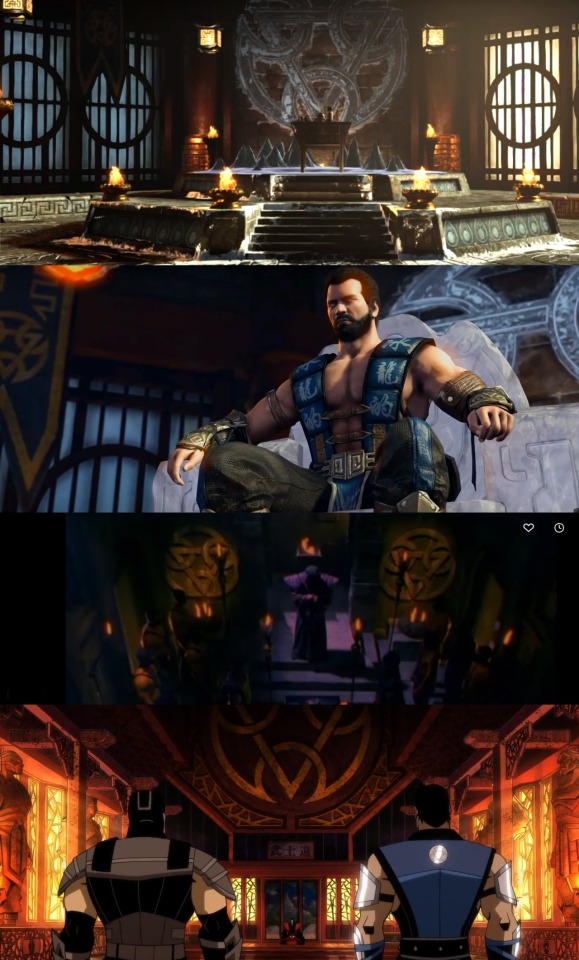
which also appears on their armor and weapons and even tattooed on their body (at least in MK Conquest TV series)
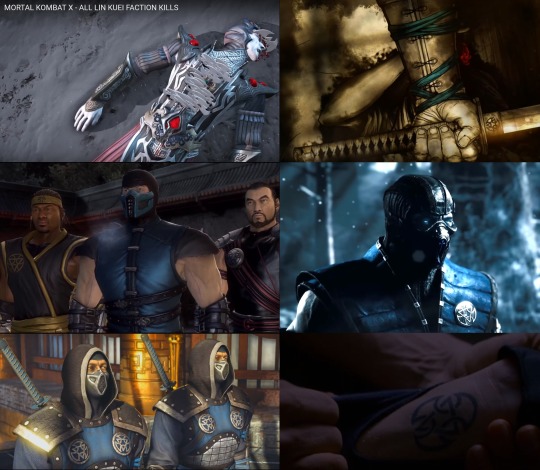
and, like was shown in Mortal Kombat Legends: Battle of Realms, the main(?) hall is decorated with statues of warriors. One looks like Sub-Zero,
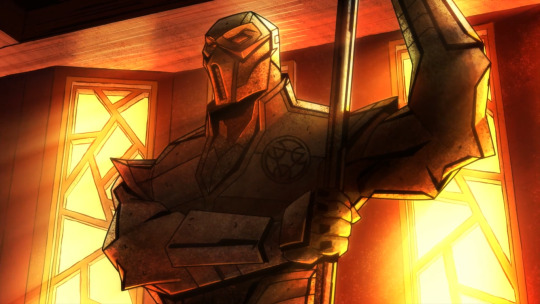
although I doubt that it is a sculpture created in honor of the fallen Bi-Han. Unless it was created so quickly, I think it could be images of the clan's founders, or images of historically important warriors, or even an anthropomorphic representation of the elements (like ice) on which the clan's power was built.
Even if the warriors themselves were not involved in crafts, the Lin Kuei had skilled craftsmen equipping them with the necessary items.
There is also an aspect of sheer aesthetics that brings psychological comfort. Something that was definitely useful to warriors who lived under a lot of pressure. The beauty of rich ornaments and spacious architecture create a safe space to meditate or relax after difficult missions or close-to-death experiences. Likewise, art could be a safe (or at least safer) way to express themselves or deal with emotional trauma, in otherwise very strict society that can not stand weakness.
Interestingly, in additional sources like game cosmetics or win poses, Kuai Liang shows creative tendencies. For examples, his ice clones have various shapes even though there is no practical use of them in win pose:
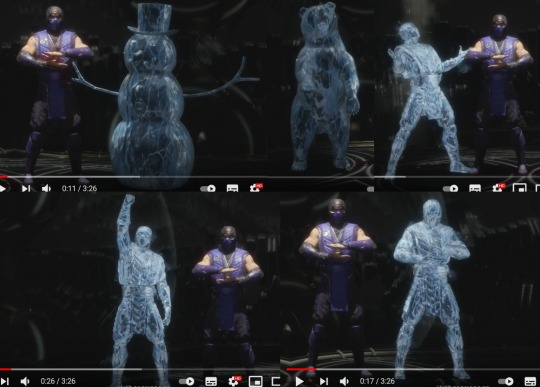
Then we have the variety of his arsenal. As a cryomancer, Kuai Liang depends mainly on his ice power to create weapons. He can use anything at hand, freeze it solid and smash, slash or stab the opponent. To kill or injure an enemy, Sub-Zero does not need a sophisticated tool yet many of his MK11!axes have additional ornaments or more defined shape than it is really necessary:

All of the mentioned examples and the not discussed detailed ornaments on Sub Zero’s armors or even his style of speech (that may be influenced by some literature considering Jacqui’s accusation of “borrowing that line”) strongly suggests to me that Lin Kuei in general appreciates broadly understood art, especially the handicraft such as armorsmith or weaponsmith. This may also be one of factors why some warriors like Kuai Liang look down on technology and especially guns, a weapon mass produced and with no finesse.
As for the tea ceremony, by no means I’m familiar enough with Asian culture to say it for sure, but it didn’t look like Japanese brewing style to me. That and I highly doubt Kuai Liang would dare to do so in front of hot-headed, distrusting Hanzo who could easily read that gesture as Lin Kuei once again mocking him and his clan. Knowing how Sub-Zero wanted to make peace, I don’t think he would have taken such a careless step. Beside that observation, it is another example how well-versed and educated Kuai Liang is, even in matters that don’t have any military use.
In summary, I personally believe that art plays a vital role in Lin Kuei society. It helps in creating and unifying their warrior identity and pride in long-lived clan traditions, brings emotional comfort when needed and gives a way to express themselves (the fighter’s individuality) in safer, subtler ways. Even if warriors don’t craft weapons or armors themselves, there are specialized groups of people who provide them with the best quality craftsmanship. Because of course Lin Kuei demands and respect the perfection.
#mortal kombat#my replies#lin kuei#sub zero#kuai liang#i probably could talk more about sub zero and arts#or in general lin kuei and arts#but the text would be too long again#and i already made people wait too long for the answers#sorry :P#maybe next time i will talk more about the not discussed here stuff#if anyone will want that
78 notes
·
View notes
Text
A Selection of England’s Relationships Throughout History
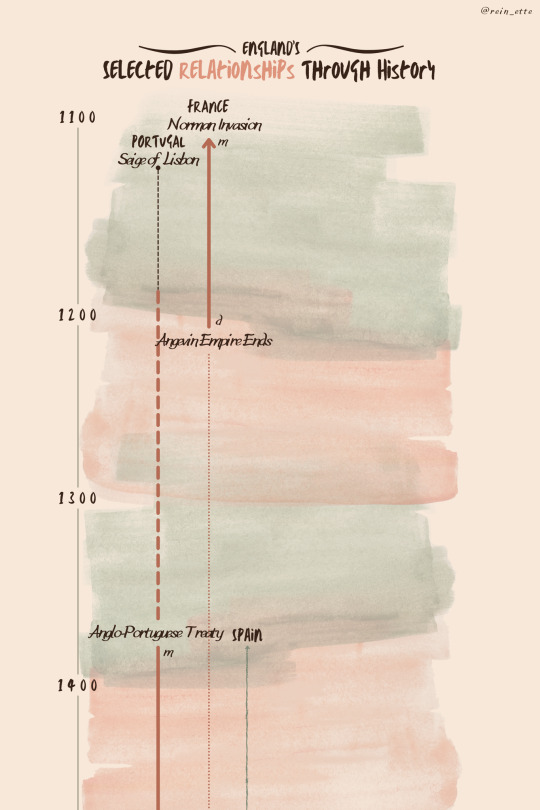
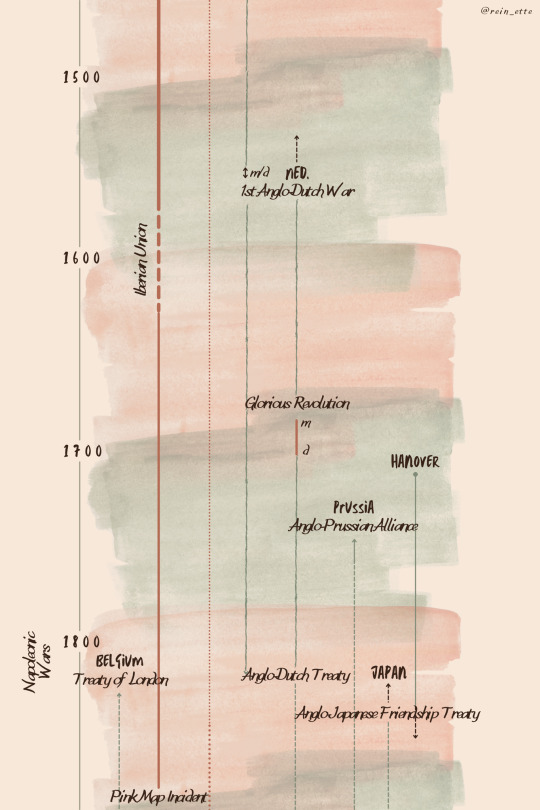
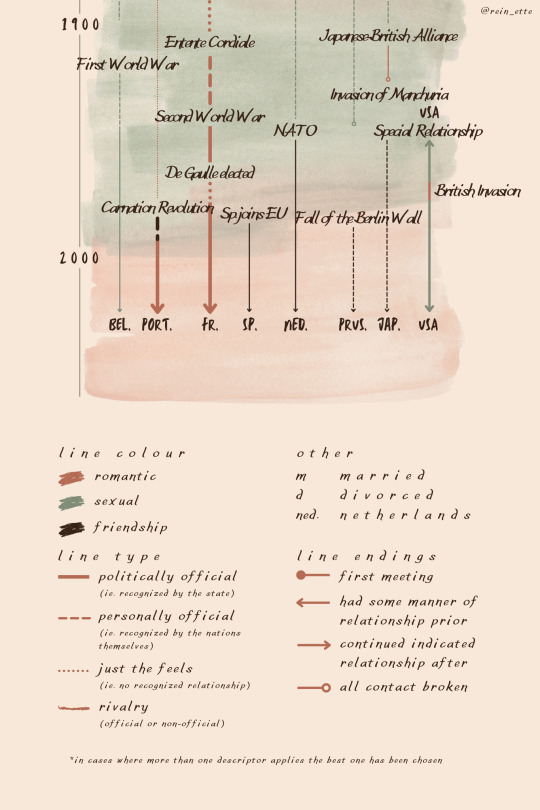
Holy this took me a long time BUT Hetalias back so gotta celebrate ♥️
Obviously these are my personal interpretations of iggy and co. — I would definitely love to hear feedback from anyone who agrees/disagrees or finds any historical inaccuracies.
Also I forgot to mention in the actual legend but the line thickness indicates the major relationship during England’s life at that time or the one he was the most invested in/committed to.
More Special Notes/Thoughts Under the Cut!
I use ship names throughout these notes only to denote a relationship between a nation and England, not necessarily a romantic one.
From a outsider point of view England’s relationship with Port and France are almost the inverse of each other, with one relationship growing stronger when the other weakens and vice versa, but actually from England’s point of view he’s just loved both of them, like, forever. For most of his life Portugal’s political agenda just happened to align better with his, so naturally more time was invested there. But I don’t think that made his feelings for Francis any less profound or intense during that time, and vice versa when he was dating France in the 20th century. Nowadays he’s allowed to do whatever he wants.
Also you actually draw the lines you really realize how long England’s been obsessed with those two amdkfjsjbdjdd
Nedeng and Engbel are so under-appreciated even though they’ve also shared the channel for like, forever? Ned had a reAl intense rivalry going on with England in the 16 and 1700s that could give Spain a run for his money — but to me the difference between SpUK and Nedeng is that the latter is actually has a more mutual respect/kinship undertone that Spain can’t share with England. Those two were born into similar conditions (dirt poor), have somewhat similar mindsets towards success (requires ruthless pragmatism and self discipline), both hate Spain and kinda France, and both like the ocean and the thrill of the more dangerous, darker aspects of life. That’s the foundation for a pretty darn strong friendship, despite the little tiffs in the middle.
I like to think Bel had a huge crush on England during the Napoleonic Wars and into the 19th century. I mean, if there’s ever time to fall in love with England, it’s during the Victorian era. Plus I think a relationship like that would balance out well the image of England as “undesirable” and “unattractive” and Bel as just the little sister foil to Ned. She has needs and wants too, and if she wants the worlds most powerful empire you best believe she’ll have him 👀. Now Eng and Bel are friends with occasional benefits.
I also think the idea that England was isolated and had no deep friendships/relationships beyond whoever he’s shipped with is inaccurate. Arthur’s definitely an intensely private and independent person, and he himself does fall into the trap of believing no one cares about him and that everyone who does try to get close wants him for something. But historically there are many nations who admired and liked him. Much of Prussian aristocracy, for example, could be categorized into “Anglophiles” or “Francophiles” and while Prussia himself is best friends with Francis, it makes sense for him to also be really close with England. In fact, historian Barbara Tuchman described the German ambassador to Britain in 1914 as being torn apart by the thought of conflict between “the country of his birth and the country of his heart.” The German people probably would not have felt as strongly, but I also see Prussia as more closely linked with the military/aristocratic class than the common people after Unification, especially since most of Germany as we know it today was decidedly not Prussian. Essentially Pruk like Nedeng is another pair that share some pretty powerful core values, including a strong, sometimes overwhelming sense of responsibility and loyalty to those they see as “entrusted” to them.
While talking about Germany, we’re actually all sleeping on England x Hanover. This was England’s longest official marriage (the Anglo-Portuguese alliance was mostly about informal commitments) and the Hanoverian House produced Iggys beloved Queen Victoria. I have to do more research here to better characterize Hanover, but I do think this relationship would have had a measurable impact on Arthur, even if it wasn’t romantic in nature (which it probably wasn’t, as the power imbalance between England as an empire and Hanover as a German province was just too great)
Asakiku is another fascinating relationship, not least because cross culture Europe x Asia relations are scarcely explored. Asakiku has so much potential for straight fluff and Arthur and Kiki just vibing about literature and music and the meaning of life, but also lends itself to analysis of more serious questions: how racism might affect nation’s personal relationships, or how nations view human rights abuses, expansionist war and those who perpetrate them, including themselves. Of course these are topics that Arthur could discuss with others like Francis or Prussia, but I think he wouldn’t be as vulnerable, calm, or reflective with anyone but Kiku — ironically because Japan and England’s politics, culture, and history are more distant.
Finally, SpUK and USUK. I feel kinda bad for tagging these cuz a lot of people love these pairings, but while I think Al and Toni both play huge roles in Arthur’s life, it’s not really romantic in nature. Besides Port and Francis Arthur’s known Toni the longest, and they make a great pair because on some levels they get each other, but on others they contrast hard (optimist vs pessimist, faith vs reason, belief in fate vs belief in agency etc.) That makes them great foils for each other but not really great long-term lovers. As for USUK I see it mostly as platonic — there may be no one in this world Artie loves more than the Al, but love can be powerful without being romantic. I do think they tried it out in the 60s during the British Invasion (see The Chosen End series) but ultimately they also have irreconcilable differences in worldview that mean they can’t really be what the other needs in a lover.
#hws england#engport#fruk#usuk#spuk#engbel#nedeng#asakiku#pruk#haneng??#that’s not a thing#but it should be#aph Hanover#sorry this got LONG#my hcs
294 notes
·
View notes
Text
Big Hero 6 The Series: It could have been better
Hello, friends. Today, I will be analyzing a TV series based on a movie that I fell in love with for its colourful themes, deep plot, compelling characters, great CGI and memorable messages. Before I get into it, I want to take a moment to say that I have quit doing videos. They are too big of a pain in the petunia to make and I write better than I speak, so I will stick to writing essays, reviews and more. Anyway, onto the analysis.
All I can say about Big Hero 6 the series is that it had a great concept, it presented some great ideas and tried hard to be a cartoon of the times, but it could have and should have been a lot better. The show’s downfall all centers around trying too hard to be kid friendly which makes the shame sting all the more because Big Hero 6 was already kid friendly even with its dark themes, sharp edges and intelligent writing. If anything, even the brightest kid friendly cartoons (Steven Universe, She-Ra, etc.) had those things and actually benefitted from them. By needlessly trying too hard, character development got scrapped, the edges were all smoothed out, storytelling was subpar, the humour was too silly and the executive meddling in the end produced a dismal final season. However, I don’t want this analysis to be one lengthy negative rant about how awful the series was because in its defense, awful is an unfair word. It did have potential and ideas which are worth carrying over to a reboot that I hope will be done someday in the future. Also, we should root for a reboot because Big Hero 6 would not be the first story that needs it before striking gold. Just look at how many times Spider-Man was rebooted in film before MCU found the version that worked. Anyway, I will list all the things in Big Hero 6 that could have been better in my opinion;
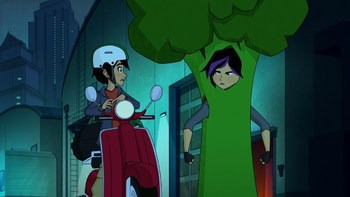
1- Go easy on the laughs and be more generous with the action. - I love adding comedy to my own writing because I think a good sense of humour makes everything better, but Big Hero 6 is not a stand up comedy routine. It is a superhero story where we expect action, suspense and life or death situations that are to be taken seriously first. The comedy should be for relief and with the right timing. Also, the chibi cutscenes and having characters act like fools aren’t funny. Ren and Stimpy are the exception not the standard and their way of making you laugh doesn’t fit an action series. In a show as big as Big Hero 6, real life physics and danger matters.
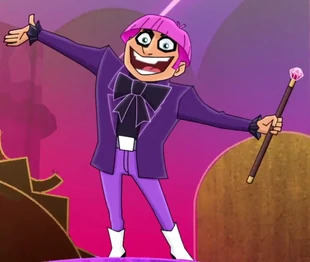
2- Make the villains menacing and gritty. - I admit that after having a movie villain like Yokai who was the stuff of nightmares, it is going to be a challenging act to follow, but it was obvious that the writers were trying especially with some villains who could have easily gone into some dark relatable territory. For example, Mr. Sparkles (the gentleman in the photo above) embodies social media and Internet personalities. Right off the bat, you have a long list of things which embody the dark side of that like scams, fraud, using social media to dox or harass, driving people to suicide, online predators, the Internet personalities being very depressed people in real life, and much more horrifying things. When you stop and look at it, Mr. Sparkles even looks like the Joker which hints how dark and scary he could have been if the stops were removed. The same goes for enemies like Hardlight who embodies online gaming, Liv with cloning, Obake an amoral and insane scientist, and Trina and Noodle Burger Boy (more on him later) being evil robots. Globby especially should have been painted and written in much darker colours rather being played off for laughs because he has many parallels with Clay Face. The only two villains who I can say were supposed to be campy, charming and comical were Baron Von Steamer and Supersonic Sue because they were a satire of the Adam West style villains.
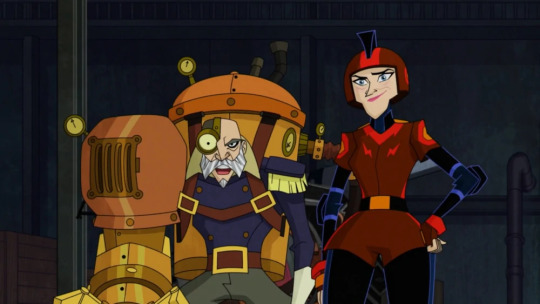
The rest of them needed to be dark and threatening including Mr. Sparkles. In fact, I would love a rebooted version of Mr. Sparkles who gives me the heebie-jeebies. Going back to Noodle Burger Boy, I must confess that I was actually excited when I heard that he was going to be the main villain of the final season because I thought he was going to fulfill his master’s final wish and as a reminder, Noodle Burger Boy was based on a super robot for military purposes.
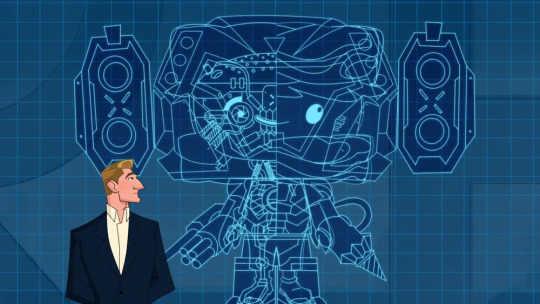
It would have been fantastic if Noodle Burger Boy was upgraded into a full military war machine with a new threatening look. For that, I think all of the villains deserve to be rebooted and have their full potential unlocked for better or for worse.
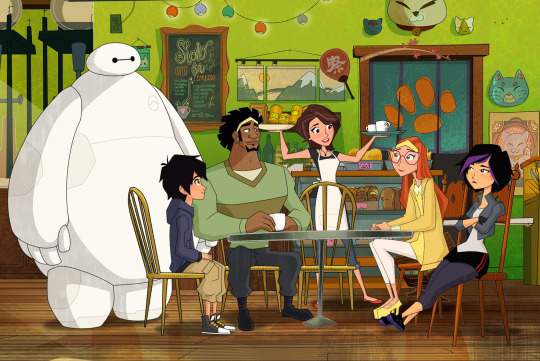
3- A show about geniuses merits genius level art quality. - I am usually forgiving towards art styles, but in the case of Big Hero 6, the oversimplified style with minimal details and lack of textures did not suit the show. The characters blend in with the background which makes them look flat and the special effects were extremely dulled down. I also know for a fact that Disney can do a lot better than this because I saw how superbly Tangled the Series was drawn.
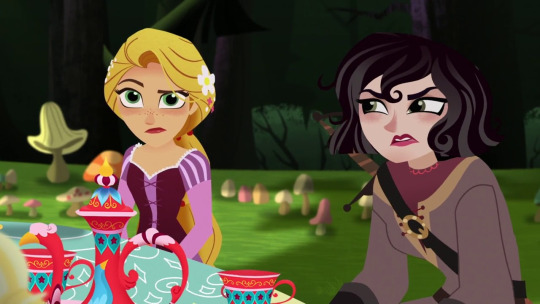
You can see and almost feel the difference in quality, the number of layers and level of detail between the two styles. I think there was no excuse Big Hero 6 was not done in the same style and at the same level if not better as Tangled.
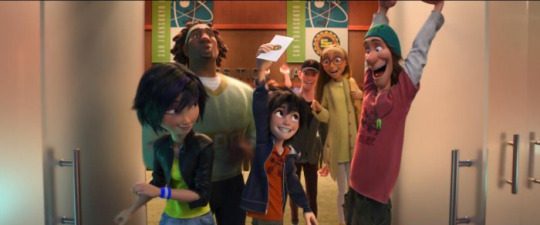
3- Don’t dumb down or flanderize amazing characters. - I absolutely detest it when characters are flanderized because it makes them one dimensional and grating. For example, Go Go is tough as nails and extremely calm, but she is not cold or hesitant towards helping her friends. She doesn’t require very special episodes for us to know that. If anything, the movie version of Go Go reminded me a lot of Garnet in how she deconstructed the broody character. She isn’t cold or emotionless. Just calm and mature. Another good example was how Honey Lemon was rewritten to be overly positive to the point of toxicity, naïve and oblivious with a juvenile obsession with stickers. Then you have poor Fred who was rewritten to be an incompetent fool. The spark that makes Big Hero 6 shine is that they are a team of geniuses meaning they are all intelligent. Even Fred is genius in his own way just not a scientific one. He has a vivid imagination, he is resourceful and can get himself out of tight spots. Please, don’t turn characters into dummies especially if their intelligence is a part of them. It doesn’t make them better or funnier. It ruins them.
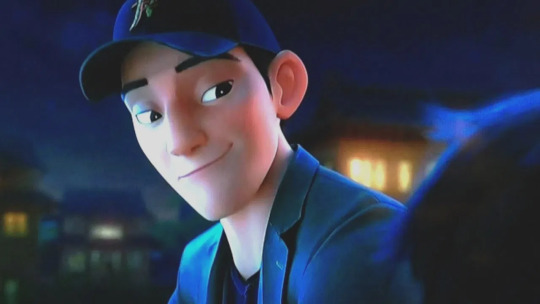
4- Tadashi needs closure and honour. - I am all for Hiro making peace with the loss of his brother, but Tadashi is to the Big Hero 6 team what Uncle Ben was to Spider-Man. His loss was the catalyst if not the reason. He should never be forgotten. Moreover, there was never any true closure to him especially with the possibility that he may still be alive up in the air. After all, like Callaghan, his body was never found and it turned out that Callaghan was still alive.
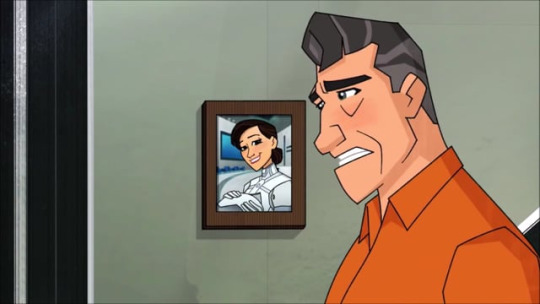
With that said, who is to say that Tadashi was not secretly still alive and just hiding or being hidden? This is something that Disney really needed to clear up if not for the fans, then at least as a service to such an important character. Never just forget about them.
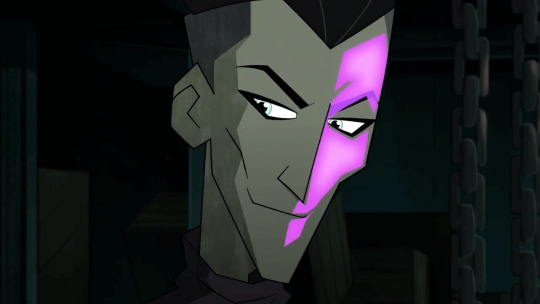
5- The format can only be episodic with a deep plots, continuity and character development. - Random episodes with a mere monster of the day is an outdated format which doesn’t fit Big Hero 6′s modern and bright setting. In seasons 1 and 2, when the episodes were plot heavy with character development, the series shined brightest. It also helped move the story along, but with the final season, plot was removed, closure was abandoned or poorly written if any was given, and characters were disallowed from growing. A good example at how plot and character development could have made this series and its characters better was the relationship between Hiro and Megan. Would it have truly survived or would they have broken up?
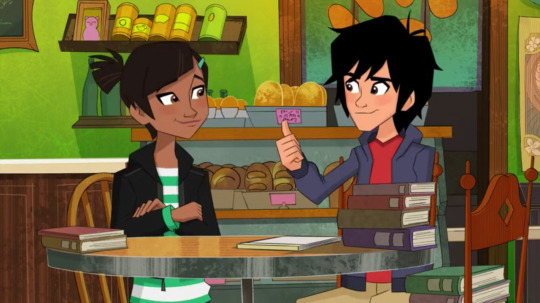
Would Richardson Mole have eventually lost interest in his obsession with besting and bullying Fred or would his obsession consume him compelling him to become a super villain? I do see quite a few similarities between Mole and Reverse Flash.
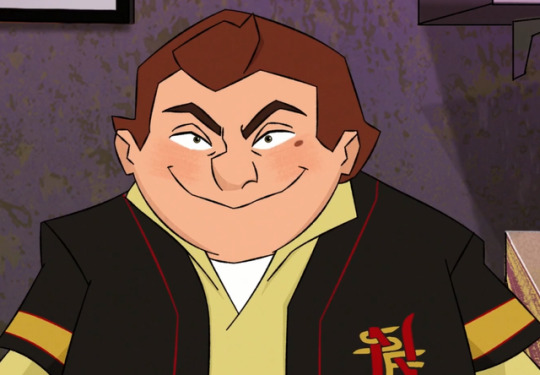
Then you have Karmi who is in my opinion, the biggest wild card of the bunch. She was intentionally introduced as an arrogant, prickly and unlikable yet complex character who rivaled Hiro bitterly.
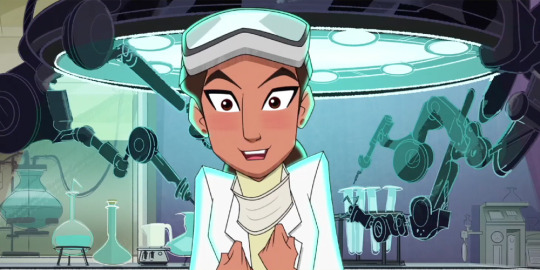
Yet had a huge crush on his alter ego and as time went on, started to grow up and even form a friendship with Hiro. What would have happened further down the road with her? Would she have become a super hero herself? Or maybe even another love interest for Hiro kind of like how Black Cat is for Spider-Man?
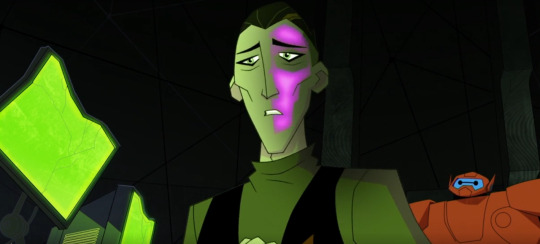
Is Obake really gone?
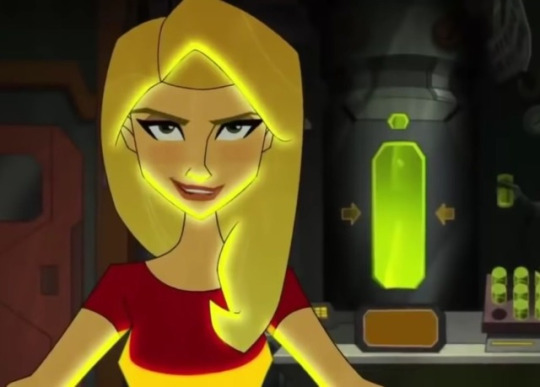
What does the future hold Diana (Liv’s clone), Liv herself or the Sycorax the genetics company?
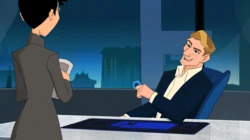
Is Alistair Krei going to become an ally to Big Hero 6 or an antagonist? There is also the issue at how little we know about the other Big Hero 6 characters other than Fred, Hiro and Baymax. What are Honey Lemon, Wasabi and Go Go’s backstories? These questions matter and while not every mystery can be solved, leaving none of them solved is lazy writing.
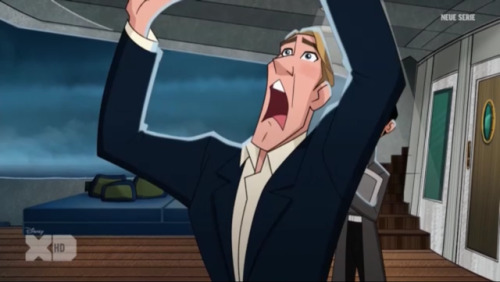
6- Executives, kindly stay out of the writing and any other part of the creative process. - I’m sorry, execs, but there is no nice way to say it. History itself proves that every time executives got involved in the creative process of any media, it got worse not better. Leave the writing to the creative team and the execs should only handle the legal stuff. Please. We understand that TV is a business, but writing itself is not. It is an art which you just don’t have a talent for. Let the creative people do their thing with the freedom necessary and you do your thing, deal? Deal.
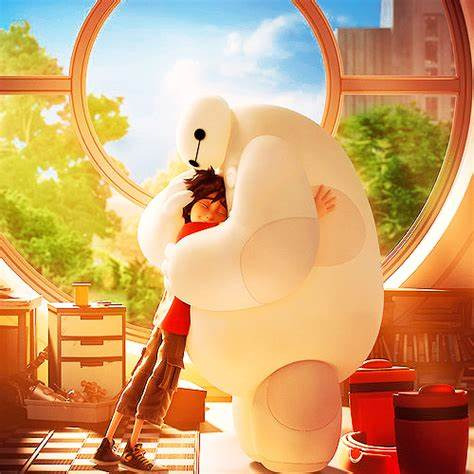
7- Focus on Hiro and Baymax. - The are the main characters so keep them at the heart of the series no matter what happens around them. That is all I can say.
And that sums up all the things that could have made Big Hero 6 the series better, but this is all just my opinion. What is yours?
PS: I am well aware that the Big Hero 6 series is being retconned because a new series called Baymax is in the works as well as the long awaited sequel to the first movie. I am looking forward to both with an open mind. PPS: I also am aware that some people liked this show the way it was including the art style and I am cool with that. An analysis for art that includes cartoons is never right or wrong. It is solely based on opinion. I may have thought this series could have been better, but there are people who make arguments that it could have been worse.
#big hero 6#big hero 6 hiro#big hero 6 the series#big hero 6 wasabi#big hero 6 fred#big hero 6 gogo#big hero 6 tadashi#big hero 6 baymax#baymax#hiro#tadashi#honey lemon#gogo#krei#obake#noodle burger boy#analysis#character analysis#diane#live#sycorax#karmi#megan#richardson mole#reboot#sequel
125 notes
·
View notes